






The announcement by Rishi Sunak of an election on 4 July took just about everybody by surprise – including, it seems, those organising his announcement unprotected from the pouring rain in Downing Street. In the ensuing weeks, while the parties are honing their campaigning stances, many of the issues being debated will be of relevance to charities.
And while care and attention are needed, charities are able to engage in the debates to make their views known. The ins and outs of what charities can and cannot do during an election are explained by a number of authoritative sources, and we are able to point towards where guidance is to be found.
• An election brings most activity to an abrupt halt. Fortunately, the inquiry by the Justice Committee into probate delays has already seen the issue aired to such an extent that some kind of action is already either in train or planned. Whether the new committee will have the same priorities remains to be seen.
• Away from election activity the day-to-day business of charities goes on. For charities for whom legacies are a major source of income the news continues to be good: legacy giving is still on the rise, with only a continuation of





the trend on the horizon. The annual Remember A Charity Week – scheduled for September – can only help to boost numbers even further.
• Away from the legacies market, life is not so rosy for charities. A sizeable source of regular income has been Payroll Giving – which allows givers to make donations before tax is calculated and means charities do not need to claim Gift Aid. Unfortunately, the past year has seen an unexpected fall in both the amount given, the number of givers and the number of employers offering the facilities.
• On other fronts, a number of news stories are familiar. The market inquiry by the Fundraising Regulator has concluded with recommendations for steps charities can take to ensure sub-contractors behave appropriately – an initiative held up by the regulator as one that justifies its levy increase.
Meanwhile, the Charity Commission is reporting little progress in persuading banks to buck their ideas up when dealing with charities’ accounts. They report some harrowing stories of lack of sensitivity, although the issue I reported on personally in a previous issue has been resolved.

The photograph on the right of border collie Nipper was taken on the same day that he’d been taken to a vet’s to be put to sleep. Purchased as a ‘surprise’ gift, he was unwanted. This beautiful puppy was just eight weeks old and is just one of over 9,850 animals rescued by Friends of the Animals.
There was a happy ending as –now renamed Stanley – he was rehomed with one of the charity’s voluntary drivers, who adores him.

Friends of the Animals began in March 1990 and had very humble beginnings. Veterinary treatment is invariably the charity’s biggest outgoing and to date they have spayed or neutered 44,000 animals. Thousands more have been wormed and inoculated – often for the first time in their lives!

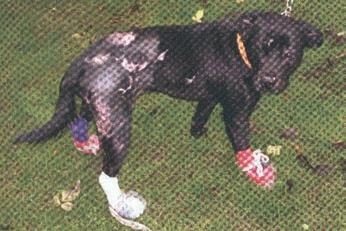
Founder Helen Sinclair MBE, who was honoured for Services to Animal Welfare in 2014, takes up the story: “There have been many memorable cases, where we’ve saved animals’ lives against all the odds. Animals such as the puppy who slipped under the railings of a balcony – luckily bouncing off the conservatory roof which broke her fall. Then there was the dog who fell down a manhole in the road after someone had removed the cover, and poor Marshall, who had three broken legs and a severed ear.
“Susie, a Labrador/Staffy cross (pictured above), was badly burnt in a house fire, but made a good recovery; and the dear little cat above had everything wrong with him, but survived and thrived.
“When 11 month old Border Collie ‘J.J.’ came into our care, she had a pin / plate poking through
a badly infected front leg, a paw so badly crushed the bones had fused together and a stab wound.
“Her original owner pleaded guilty to causing unnecessary suffering to a protected animal and was fined £2,000 and banned from keeping an animal for ten years.
“As you can see from the wonderful photo below, ‘J.J.’ went on to much better things.”

Gifts in wills fund one in two veterinary treatments and so legacies are an absolute lifeline to the rescue and spaying/neutering work carried out by Friends of the Animals.
The charity has a policy of non-destruction, unless an animal is sick or injured with no hope of recovery, and they keep admin costs to a minimum. Very importantly, 95% of their staff are volunteers, which ensures as much of your gift as possible is spent on saving animals.
Pitted against that constant battle to save lives was the action of the person who set fire to the front of the Charity’s base.
“But, happily,” said Helen, “we're a resilient team and together with the help of supporters, we barely skipped a beat and just kept on going.

“We truly appreciate that people have many choices regarding charities to support, but no one appreciates it more, or tries harder than we do, to get the very best possible use from every penny donated. Thank you for your consideration.”


[ THE ANNUAL CONSUMER TRACKING STUDY by Remember
A Charity has found that the public’s appetite for legacy giving is on the rise, with more than one in five charity donors (21%) aged 40-plus saying they have included a charitable gift in a will – up from one in seven (14%) in 2010. Over the same period, rejection of legacy giving has dropped from 13% to 9%.
Commissioned by Remember A Charity, the consumer benchmark study explores the public’s attitudes to legacy giving, with regular surveys carried out since 2009. The latest survey was carried out by independent research firm OKO in December 2023: an online survey of 2,001 charity supporters across the UK, aged 40-plus. The research has been carried out by OKO since 2021, and by nfpSynergy before that.
Figures from the 2023 survey, released on 15 April, found that supporters with a will in their 40s and 50s are most likely to have pledged a legacy gift – with almost four in 10 (37%) having included a charity. That compares with around one quarter (27%) of those aged over 60. Legacy pledgers are also more likely to be single and without children or grandchildren. Pledger rates are highest among those who are affluent, aware of the inheritance tax incentives, and who have sought professional advice for their finances.
Three quarters of supporters (77%) say they would be willing to leave a small percentage of their estate to charity, with more than one in 10 (13%) saying they would be open to leaving 10% or more of their estate.
Lucinda Frostick, director of Remember A Charity, welcomed the findings, saying: “This study shows the long-term positive shift in legacy giving attitudes and behaviour, and that the propensity for giving in this way is gaining ground beyond the Baby Boomer generation, particularly for those in their 40s and 50s. This indicates that there’s great potential for continued growth of the legacy market, but it also stresses the importance of supporter stewardship.
“Legacy income is crucial for an increasing number of charities. While we can’t impact the economic environment that drives legacy values, we can positively influence the proportion of people choosing to leave a gift – by working together and engaging with legal partners, government and others to make legacy giving a social norm.”
The study shows an incremental rise in will-writing, with almost two thirds (64%) of supporters having written a will: up from 63% in 2022 and 62% in 2021. Of those with a will in place, almost one third (31%) have included a legacy donation: up from 29% in 2022. Around three in 10 (29%) pledgers added charities when making changes to an existing will.
The average age when first making a will is 51 years, although more affluent individuals are more likely to write their will at a younger age. Key life stages such as births, deaths and marriage are the main triggers for will-writing, with the death of a loved one featuring more heavily for younger will-makers and retirement a common trigger for older will-makers.
Professional advisers continue to play a key role in will-writing, with almost six in 10 supporters (57%) saying they have used or would use a solicitor to write their will and 17% a professional willwriter. Free Will schemes are more likely to appeal to younger and less affluent audiences.
Legacy giving is one of the largest sources of voluntary income for UK charities, raising £4bn annually.
Additional findings include the fact that 64% of legacy pledgers haven’t let charities know they have included a gift; and of those, almost half (47%) say it never occurred to them to tell the charity.

For 25% of them, they can’t see how it would help to let the charities know.
The biggest barrier to leaving a gift in a will for supporters is that they want to leave everything to family or friends (63%). q
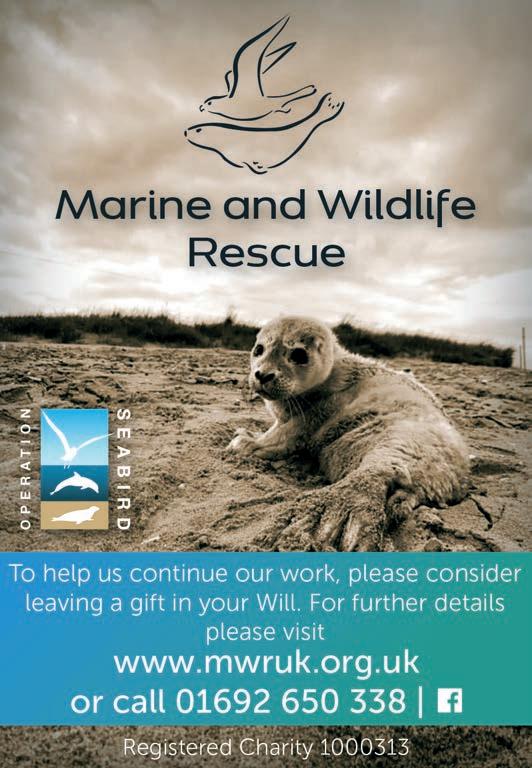
[THE Universities Federation for Animal Welfare (UFAW)’s vision is of a world where the welfare of every animal affected by humans is maximised through a scientific understanding of their needs and how to meet them.
UFAW promotes a scientific approach to advancing animal welfare by:
• discovering what matters to animals
• developing scientific solutions to animal welfare problems
• disseminating evidence-based information as widely as possible so that it can be used to make real-world improvements to the lives of animals.
One of the ways that they have been doing this is through their work on genetic welfare problems of companion animals.
What’s the issue?
In recent years, the problem of health issues related to genetic diseases and unsuitable breeding has been cited as a top welfare concern for the veterinary profession, animal welfare professionals and others. Some genetic diseases arise due to random mutations that become established in a breed, but in other cases welfare problems can occur as a direct result of features being selected. Perhaps the most obvious example is the breeding of brachycephalic (flat-faced) dogs.
Despite a number of organisations highlighting the potential issues faced by flat-faced breeds such as breathing, neurological, skin, ear and eye problems, the number of these dogs in the population

is rising. UFAW recently funded a study that aims to understand why such animal welfare campaigns may fail, with the aim of laying the foundation for more effective educational material and campaign strategies for breeders and potential owners.
Using the results of this and other studies, they will continue to update their existing website dedicated to providing information for prospective pet owners, breeders and others with the aim of reducing the severity and incidence of breed-related welfare problems in companion animals.
UFAW is an independent charity and membership society. They receive no government or statutory funding and rely solely on the generosity and support of donors.
This study is one of many supported by UFAW which uses science to create quantifiable, significant change.
If, like UFAW, you believe in science in the service of animal welfare, please consider making a donation. Your donation, however big or small matters, just as the welfare of every animal does too. Visit www.ufaw.org.uk/springappeal q

[THE WINNERS OF the 2024 Legacy Futures Crispin Ellison Bursary Awards have been unveiled. The Crispin Ellison Bursary aims to further professional development in legacy administration.
It is named in memory of the ILM founding member and lifetime president, whose career was dedicated to advancing professional knowledge in the legacy sector.

The two winners will each receive a training package from the Institute of Legacy Management up to the value of £1,000, leading to the Certificate in Charity Legacy Administration (CiCLA).
This year's winners are Layla Brown (above left) from Rennie Grove Peace Hospice in Tring and Katy Lee (above right) from St Gemma’s Hospice in Leeds.
The judges – Rebecca Billen of Blood Cancer UK and Matthew Lagden, director at the ILM – felt that each of these future leaders demonstrated a breadth of skills, talent and passion that will serve them well as they develop their careers as legacy professionals.
Layla Brown commented: “I am incredibly grateful to have been awarded the Crispin Ellison Bursary for 2024. Since starting in legacy administration at Rennie Grove Peace Hospice Care I’ve learnt so much and have developed a real passion for legacies.
“I’ve been eager to pursue the CiCLA qualification so I can expand my knowledge and confidence in this sector. I can’t wait to get started and I’m looking forward to all the opportunities ahead that will

enable me to make a positive impact to the charity by maximising our legacy income.”
Katy Lee said of winning the bursary: “I am so thrilled to have been selected as a recipient of the 2024 Legacy Futures Crispin Ellison Bursary Awards and cannot wait to start studying for the Certificate in Charity Legacy Administration.
“I am the Individual Giving Manager at St Gemma’s Hospice and have a real passion for legacy fundraising, as gifts in wills fund vital care for one in five of our patients. I applied for this bursary as I find legacies an incredibly interesting area of work, and an area within which I wish to increase my knowledge. Gaining the CiCLA will really help consolidate and enhance my current knowledge of legacy administration, helping me to deal with more complex issues.
“Obtaining this certification will hugely benefit my personal development, but will also be of real benefit to St Gemma’s Hospice. Increasing my knowledge and confidence in managing legacies will help to grow income from gifts left to St Gemma’s by ensuring aspects such as charity tax exemptions are maximised, and I will also be able to train my team more effectively and pass on knowledge to the next generation of legacy fundraisers. I am so grateful to be given this opportunity.”
The bursary is open to applicants from the UK, who are looking to further their professional development in the area of legacy administration and management. q
[ANIMAL CHARITY Wild Futures rescues and offers sanctuary to monkeys who have suffered abuse and neglect. They are dedicated to protecting primates and their habitats worldwide – primates are endangered due to climate change, habitat destruction and the bush-meat and pet trades.
For some species, it is too late. The future of all that remains lies in our hands, so leaving a legacy to Wild Futures is the gift of life and a future for primates and our wonderful planet. Wild Futures’ holistic approach makes them unique – providing sanctuary to rescued
monkeys, supporting projects overseas, campaigning for primate welfare, educating to protect primates worldwide and promoting a sustainability and ethical ethos.
They receive no government funding, so the generosity of those that remember Wild Futures is essential to enable them to continue their work. A legacy can be the gift of a life worth living and a wild and safe future for all. q
• For more information call 01503 262532, email giving@wildfutures.org or visit the webiste at www.wildfutures.org



[FOR THE PAST 20 YEARS oncology researchers at Manchester University have been funded by Caring Cancer Trust (Stopcancer. health), which funds ethical, animal-free research into cancer, its non-invasive treatment, cure and prevention. They have discovered potential new causes of children’s cancer, developed new treatments for early-stage cervical cancer and are now working on cancer prevention for children and adults of older-age.
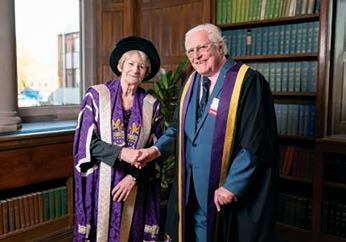
Increased life expectancy – people are now living longer than ever before – has been accompanied by an increase in many agerelated disorders, including cancer. Age-related damage to cells has by far the greatest influence on human health, promoting development of not only cancer, but also cardiovascular, neurodegenerative and autoimmune diseases. Novel treatments inhibiting cellular ageing have the potential to reduce the development of cancer and all those ailments simultaneously, rather than having to treat each separately. Such treatments will not just be for the benefit of older people. They will also benefit children and younger adults, since the use of chemotherapy and radiation for cancer treatment artificially accelerates the ageing process.

More recently Caring Cancer Trust has funded Ravan Bio Ltd, Manchester University’s spinout company, to develop a novel anti-aging treatment to prevent cancer and the other agerelated diseases. Indications for Ravan Bio’s new therapy are that it is extremely successful, resulting in an 80% reduction in the biological age of test subjects, and has potential for cancer prevention and other age-related ailments.

Stopcancer.health provides special Youth2Go healing holidays of creative adventure for children recovering from cancer. Venues include the Alps, France, Channel Islands, Isle of Wight and elsewhere in England. The holiday enables them to regain their self-confidence and re-ignite their passion for life after the trauma of their illness and lengthy debilitating chemotherapy or radiation treatment. They also provide financial support for children’s oncology units at hospitals in Manchester, Oxford, Southampton and Exeter.
A cancer-free future
Stopcancer.health funds research that will increase understanding of how silent infections, lifestyle, diet, genetic predisposition and environmental pollution can lead to cancer in children and adults. Simple changes in lifestyle and diet, combined with avoidance of exposure to environmental pollution, will prevent the incidence of cancer in all age groups.
Stopcancer.health aims to identify and understand hitherto unknown cause-and-effect relationships to either limit exposure to such carcinogenic factors or devise therapies which suppress their effects before a cancer has developed. Their research mission for cancer prevention involves:
• New life-saving cancer prevention medicines
• New therapies for early-stage cancers
• New therapies for children and later-life
• cancers
• Cancer avoidance lifestyle, diet and
• environmental changes
• Heightened cancer awareness by all
Caring Cancer Trust’s Stopcancer.health programme and charity shop is entirely managed and run by unpaid volunteers. Its research and Youth2Go programmes are funded by legacies and donations. All gifts fund animal-free research into cancer treatment

Artistic Creative Adventure on Jersey with Midnight Gallery
and prevention, as well as creative adventure holidays for children recovering from cancer. q


[ AT The Humane Slaughter Association (HSA), a crucial part of their work is to advance and promote the use of humane methods for the transport and killing of farmed animals globally through research and education.
One of the ways that they do this is by funding research that aims to improve animal welfare beyond the farm gate.

At the end of 2023, HSA awarded £10,000 of funding to a project aiming to improve chicken welfare during transportation in Malawi.
What are the current welfare issues?
Traditionally in Malawi, groups of up to 50 live chickens are transported to markets upside down whilst suspended from the handlebars of bicycles. The chickens often continue to hang upside down from the handlebars in excessive heat for several hours after reaching the market.
Such methods of transport and handling can result in broken wings and legs, weakness and at least a 10% mortality rate.
What does the project aim to achieve?
In the current project, the Lilongwe Society for the Protection and Care of Animals (LSPCA) are working to replace the traditional method of transporting chickens with welfare-friendly crates. This simple change allows chickens to be transported far more humanely.
Twenty local craftspeople from various areas of Lilongwe will be trained to make bamboo-woven crates to ensure a consistent supply.

What impact will this have?
In a pilot study conducted by the LSPCA, the locally-produced crates proved so popular with chicken vendors that the trial had to be doubled to accommodate the increased interest. It is hoped that with HSA funding, a further 500 chicken vendors will receive both the training and crates. This has the potential to improve the welfare of hundreds of thousands of chickens annually.
Will you help make practical and lasting improvements to animal welfare beyond the farm gate?
HSA is an independent charity and receives no government support or statutory funding. They rely solely on the generosity of donors and supporters.
With your support, HSA can create lasting and tangible change for food animals all over the world. To help improve animal welfare beyond the farm gate, please donate by visiting www.hsa.org.uk/springappeal q

[ THE ANNUAL Conference of the Institute of Legacy Management (ILM) took place on 10 May and was heralded a huge success. Around 300 delegates gathered at etc.venues in London’s Bishopsgate to hear a packed agenda of speakers, award presentations and panel discussions, as well as enjoy the opportunity to network with their peers and make new contacts.
ILM chair James Stebbings opened proceedings by thanking the sponsors before taking the audience through its values, vision, mission and strategic goals.
With an emphasis on communication, he said: “The ILM tries to be the voice of legacy managers. We need to be known beyond this room; that’s why there will be a real focus on communications – sometimes an external voice is more important than an internal one.”
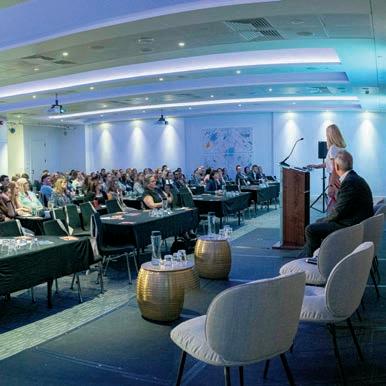
ILM CEO Matthew Lagden then announced the results of a recent Today’s Wills & Probate survey, and the launch this autumn of a new Love Your Legacy Manager campaign. Aimed at senior leaders in the charity sector, it will include a CEO information pack, a social media campaign and guidance on working with ACEVO, the Association of Chief Executives of Voluntary Organisations.
This year the main focus of the panel discussions was on property, with sponsors providing insights into topics such as developments in planning law from Shakespeare Martineau, a property market update from Berrys and the role of auctions in legacy disposals, succinctly explained by Savills.
The challenges of dealing with listed buildings (the listing does apply inside and out), what to consider when looking at sale potential for a piece of land and the intricacies of a Local Plan all featured in the presentations. Particularly popular was a panel discussion entitled Approaches to Property in an Uncertain Environment, where the delegates responded to questions taken from real-life scenarios, featuring everything from disgruntled neighbours to gazumping.
One of the issues that garnered the most attention was that of charities dealing with the difficulties of selling leasehold retirement flats: a topic that struck a chord with around half of all delegates and is set to be returned to at a later date.
Away from the property arena, the Hugh James team provided a contentious probate update with its very own music-themed Top of the Cops, which ranged from undue influence to will forgery and assisted suicide/mercy killing.
As ever, Legacy Foresight provided valuable overview and insight with a State of the Nation presentation, which looked at both the short and long-term outcomes for the legacy sector.
Wrapping up the day, James Stebbings thanked the speakers, sponsors and delegates, saying he hoped they had found it both interesting and informative, concluding: “Your commitment to the ILM is what makes today special – I have loved it and we will hopefully see you all next year.” q



UNTIL
[TODAY, ONE IN 700 BABIES in the UK are born with a cleft lip and palate, the most common form of birth defect.
The impact on a child’s life as they grow is profound. It may affect not only the way they look, but also their speech, hearing and dental development. And it can leave deep psychological scars.

In the developing world, patients with clefts are frequently not operated on until later in life, if at all. As a result, they may be malnourished and unable to talk well or hear properly. Often, they will be social outcasts.
At CLEFT, our vision is of a future where clefts are preventable. Until we get there, we want to improve the lives of those born with cleft lip and palate – in the UK and in poorer countries around the world.
Join the research effort
By funding research, we continue to make headway into understanding why clefts occur and to deliver pioneering new treatments that deliver kinder, more effective and more efficient care for children with cleft lip and palate.
Help us support cleft care worldwide
By supporting the development of cleft centres in low and middle-income countries we aim to give children born with clefts in these poorer countries the same opportunities available to children in the UK. Each donation takes us a step closer to reaching our goal. All gifts could have a direct impact on changing the lives of many hundreds of thousands of babies and children around the world. q
[THERE ARE TWO MILLION people in the UK living with sight loss and by 2050 the figure is set to double. Being diagnosed with any form of sight loss is lifechanging and devastating for both the individuals concerned and their families.
The Partially Sighted Society is a national charity that understands this; it has been providing help and support to anybody living with sight loss for over 50 years.

The society’s range of services includes the design, printing and provision of bespoke school exercise books for children, a specialist low-vision and sight test service, and the provision of aids and equipment to assist those living with sight loss to continue to live full and independent lives.
They are there to offer support for both the practical and the emotional impact of sight loss, by phone and in person. They also offer a range of social and support activities to alleviate the social isolation that comes with sight loss.
Leaving a gift in a will is a meaningful way of helping The Partially Sighted Society to help others. Legacies leave a lasting impact on transforming the lives of those living with sight loss. q
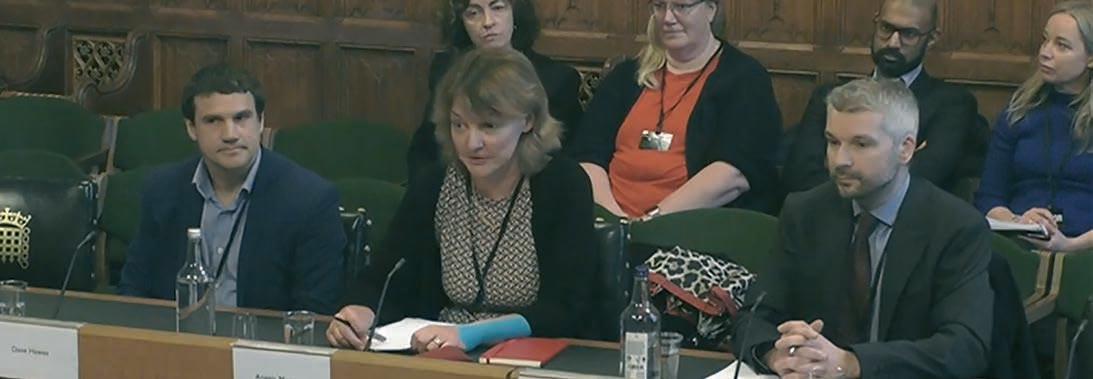
[THE COMMONS SELECT COMMITTEE ON JUSTICE’S inquiry into probate has been hearing evidence from a number of organisations.
On 12 March 2024, the committee heard evidence from three representatives of the charity sector, demonstrating the significant impact of probate delays on charities. The three representatives were Alex McDowell, vice chair of Remember A Charity and director of fundraising at The Duke of Edinburgh’s Award; Angela Morrison, chief operating officer of Cancer Research UK; and Dave Hawes, director of finance and infrastructure at Devon Air Ambulance Trust and a board member of the Institute of Legacy Management (ILM).
They highlighted how delays at probate affect both charities and beneficiaries of charitable services, particularly those that are reliant on funding from gifts in wills.
During the session, they welcomed recent improvements in probate output and opportunities to collaborate with HM Courts and Tribunals Service (HMCTS), and suggested improvements for long-term change.
They called for appropriate resourcing for HMCTS, enabling probate teams to upscale their services and meet rising demand as death rates climb, reflecting, too, on the growth of charitable gifts in wills. They also called for more publicly available data on the scale and scope of the backlog and on-going workflow, including ‘stopped’ estates, to ensure that charities have the information needed to inform their forecasting, and for continued collaboration with the charity sector to ensure that any changes or proposed improvements reflect charities’ needs and have no unintended consequences on charities.
While the focus of that hearing was on charities and how their services, forecasting ability and wider finances are impacted by the probate system, the panellists also reflected on the profound impact on grieving families, many of which turn to charities for support.
Speaking after the event, Alex McDowell commented: “Charities are increasingly reliant on income from gifts in wills, and any delays or problems at probate can have a significant impact not only on funding for vital charitable services and beneficiaries, but on charities’ ability to forecast their income and budget for the future.
“We’ve seen probate output levels improve significantly in recent months, and that’s the chink of light that charities have been waiting for to enable them to shore up their support for beneficiaries at a time when demand for charitable services has never been higher. And now, for charities to be able to continue delivering such critical services, it is vital that the Probate Registry is equipped and resourced to manage the increasing number of cases at probate, without compromising on quality.”
Dave Hawes said: “This was a welcome opportunity to explain why and how probate delays have impacted charities of all sizes right across the sector, which I’ve seen both as a director of Devon Air
Ambulance and as a board member of ILM.
“The probate service is crucial to ensure that people’s last wishes are followed and it’s important that HMCTS is able to support this in a timely manner both now and into the future.”
Remember A Charity and the ILM have been working closely with HMCTS as part of the Probate Service Users Working Group, ensuring the impact of delays on charities is represented in key discussions and factored into ongoing service developments.
Alex McDowell added: “HMCTS has already committed to several steps to improve the probate ecosystem for charities, which includes provision of more information on cases in the system and an indicator to identify charitable estates in the system. We are grateful to the team for their continued support and recognition of just how crucial the probate service is for charities.”
The following month, on 30 April, one of those giving evidence to the inquiry was Ian Bond, chair of the Law Society of England and Wales's Probate Professional User Group.
Following the session, Law Society president Nick Emmerson said: “Delays to the probate service can adversely impact families during a difficult time, as they deal with the loss of their loved one. We are aware of significant delays to the probate service. In 2016, before changes were made to the probate service, applications took on average seven to 10 working days to process. Most recent data shows delays of more than 13 weeks.
“It is unacceptable that some families are forced to wait in limbo for over three months, as they manage the complex administration that follows the death of a family member. Delays have also forced grieving clients to incur additional costs, such as unnecessary interest payments on outstanding inheritance tax. Many property transactions also fall through.
“We welcome HM Courts and Tribunals Service’s commitment to reducing delays. There have been gradual signs of improvement –with HMCTS reporting more grants being issued than applications received at the end of 2023. However, there needs to be sustained improvements in the probate service.
“Beyond recruiting new staff, HMCTS must train staff to possess the required knowledge and level of expertise to handle both digital and paper applications. HMCTS should also undertake further consultation before expanding the digital service to ensure future online probate processes are user friendly.
“We are grateful to the committee for launching this inquiry. We hope that it results in positive action being taken to address the ongoing issue with probate delays and helps to get the system functioning again, so that probate applications are dealt with in a timely manner.”


[
ZANE: ZIMBABWE A NATIONAL EMERGENCY is a UK registered charity working to help the most destitute, vulnerable and impoverished people in Zimbabwe. It is the largest supplier of financial aid to elderly people in Zimbabwe who lost their life savings and pensions in the economic collapse and subsequent hyper-inflation.
This includes around 500 frail veterans and their widows who fought for the Crown. ZANE assists with rent, medical bills and food –and, crucially, also provides comfort, advice and support.
In addition, ZANE funds a clubfoot correction programme, successfully treating over 5,400 children to date. ZANE also funds education programmes including the provision of pop-up classrooms in a high-density township for children who would otherwise not receive an education. It runs creative therapy workshops for women living in extreme poverty who are victims of political violence and trauma.

Zimbabwe remains a country in crisis. With some of the highest inflation and unemployment rates in the world, Zimbabwe’s economy teeters on the brink of collapse. Coupled with a woefully inadequate healthcare system, the need for ZANE is greater than ever for the most destitute people in Zimbabwe. q
• To find out more about the work of ZANE visit www.zane.uk.com
[
KIDNEY KIDS SCOTLAND, a very small charity with a huge heart, has for the last 24 years supported Scottish children with renal and urology conditions. The main aim of the charity has always been to enable these children to receive treatment as close to home as possible and minimise disruption to the family unit.
In addition the charity helps hospitals all over Scotland, supplying them with much needed equipment and funding posts recognised as being essential. Chronic Kidney disease is a condition that has no cure and that children and their families must learn to live with.
IMAGINE your child only being able to drink 400mls in one day. That’s less than two cartons of juice – a can of juice is 500mls.
IMAGINE being a parent where you must be home before 8pm every single night to ensure your child gets their daily home dialysis.
IMAGINE not being able to take your family abroad or too far away from the hospital because your child cannot go without their dialysis. This HAS to happen in hospital 3 or 4 times EVERY week.
IMAGINE your child missing out on school education, social activities, family members’ birthday celebrations, a sibling’s sports day or a family wedding because you need to make sure they receive their life saving dialysis treatment.
IMAGINE your child spending their birthday and/or Christmas Day in hospital and not being able to see their friends from week to week. q
IMAGINE LIVING WITH KIDNEY DISEASE
For more information about Kidney Kids Scotland please visit our website at www.kidneykids.org.uk, call 01324 555843 or email office@kidneykids.org.uk
Kidney Kids Scotland can help in many ways
[ THIS YEAR’S Remember A Charity Week will be taking place from 9-15 September. Remember A Charity Week is an annual celebration of the power and impact of legacy giving. Throughout the week, campaign partners, solicitors, will-writers, charities and others will be championing the legacy message, encouraging people across the country to help build a brighter future by leaving a gift in their will to charity, after looking after family and friends.
Joining forces with the hundreds of charities, professional advisers and partners across the UK to celebrate Remember A Charity Week will be legacy reporting experts Smee & Ford.

On its blog, Smee & Ford explained: “Offering generous tax incentives, this form of charitable giving is on the rise and is helping to fund vital services across the country – both now and for future generations. One in four professionally written wills now include a charitable donation, raising £3.85bn for good causes annually. Within the current economic climate, those gifts really have become crucial for thousands of charities and community organisations.”
For those who missed it, the 2023 campaign celebrated the funny moments, interesting hobbies and unique quirks that we remember and cherish about our loved ones. Everyone was encouraged to think about how they'd like to be remembered, and to consider leaving a gift to charity in their will alongside family and friends. Highlights from contributions can be viewed at www.rememberacharity.org.uk/be-remembered/. q

[FAILING EYESIGHT is nothing short of a personal catastrophe. Do you have a family member, friend or neighbour who is gradually losing their sight?
Reading, recognising friends and living skills are all affected as your sight is going – and it’s much harder if you live alone.
The National Federation of the Blind of the UK (NFBUK) keeps its members in touch with general information, help and updates on what’s going on.
The charity produces bi-monthly news magazines and circulars in audio, braille or electronically, which members can read independently. It also encourages blind and partially sighted people to play a fuller part in society. q
• For further information contact NFBUK on 01924 291313, email admin@nfbuk.org or visit www.nfbuk.org
[ IRWIN MITCHELL has partnered with Remember A Charity, signing up 12 of its offices as Campaign Supporters to help raise awareness and inspire more people to leave a gift in their will.
In the past five years Irwin Mitchell’s provision of will-writing services for charity supporters has resulted in legacy pledges of over £34m to UK charities, with the firm reporting a rise in cl ient appetite for this form of giving.
Now, through its new collaboration, Irwin Mitchell aims to help charities grow the vital income stream by championing the charitable option with their will-writing clients across the country.
It includes:
• Educating clients – when drafting a will, consistently
• highlighting the charitable option and informing clients about
• the benefits of leaving charitable legacies in their wills,
• including the potential inheritance tax advantages
• Promoting charitable options – offering comprehensive advice
• on the options available when it comes to legacy giving,
• including gifts of specific items, cash amounts or a share of the
• estate
• Looking within – encouraging colleagues to engage with and
• explore legacy giving, fostering genuine support and greater
• understanding of the importance of this special way of
• supporting good causes
Ian Bond, a partner at Irwin Mitchell and a contributor to Remember A Charity’s Legal Sector Advisory Group, commented: “At Irwin Mitchell we are delighted to be working with Remember A Charity to raise awareness of charity legacy giving which can ultimately lead to a more significant number of people considering and executing charitable bequests, which benefits society by supporting the valuable work of charities.”
Lucinda Frostick, director of Remember A Charity, said: “It’s wonderful news that Irwin Mitchell will be championing the option for clients of remembering a charity in their will. Talking about a client’s charitable intentions, their values and passions can be such an empowering part of people’s estate planning and generates vital income for the nation’s charities.
“Legal firms and professional advisers play an increasingly important role in ensuring clients are aware of the opportunity to leave a lasting impact on the causes close to their heart, alongside taking care of family and friends.” q




[BEFORE YOU TURN OVER this page, there are two or three things the people at Heartburn Cancer UK want to say to you:
One is for you, and the people you know and love. If you – or they –have persistent heartburn, please get it checked by a GP. Not everyone realises it, but it could be a sign of a cancer.
Cancer of the oesophagus is a killer that hides in plain sight. It’s the fourth most deadly cancer in men, which is often diagnosed late – sometimes because people ignore the common warning signs of heartburn, indigestion or acid reflux and mask them by the long-term use of over-the-counter treatments, such as Gaviscon or Rennie.
So, do yourself a favour; if you often suffer regularly from heartburn, get it checked. Ring your doctor today: it might just save your life.
The second thing they want you to know is for your clients: supporting HCUK with a legacy is a way of passing on hope. They’re currently working with some of the UK’s top experts to get an early warning test – called the capsule sponge test or heartburn health check – into every GP surgery in the country.
They have the test; they know it works; but it is still not yet widely available, and people are dying while they wait. A legacy, large or small, can help change that.
Legacies can help run campaigns to challenge policymakers and support research, or pilot projects to help prove both the effectiveness and need.
[ TO MARK Oesophageal Cancer Awareness Month in February, HCUK took one of their mobile diagnostic units to Lanesborough Hotel on London’s Hyde Park Corner, and provided free capsule sponge tests for people who suffer from persistent heartburn.
The project – which was an incredible collaboration between HCUK, The Lanesborough, The Cleveland Clinic and Cyted, the test developers – attracted an enormous amount of attention in national newspapers and from passers-by.
The results are still being analysed, but first indications are that around 20% of the people who had the test will now either get treatment to save their lives or will join monitoring programmes to make sure their conditions don’t develop into something more life-threatening.
The capsule sponge test also picks up a common potentially pre-cancerous condition called Barrett’s oesophagus, which has no specific symptoms but which can be regularly monitored when it’s found. q


The third thing is for you both. HCUK are demanding change to save lives now and in the future.
Heartburn Cancer UK was started 21 years ago by its chair Mimi McCord, after her husband Mike died aged only 47, nine weeks after being diagnosed with cancer of the oesophagus.
Mike had suffered from heartburn almost all his adult life. But had no idea that it was a sign of the cancer that would kill him before he was 50, when he still had dependent children. Mimi couldn’t save her husband, but she’s been determined to change other lives.
The charity focuses on raising awareness that not all heartburn is harmless, so people know to go to the doctor; and if there is a problem will start getting help as soon as possible. Early diagnosis means better survival rates and the need for less traumatic treatment.
They’re working hard to bring about the change they need; but the fight is long: it’s already been 21 years. With the help of their supporters, however – including those who generously leave legacies – and by arming people with more knowledge of the symptoms, they are helping to save lives every day.
Noddy Holder supports HCUK with ‘Get It Checked’ Oesophageal cancer survivor, the legendary Noddy Holder, has supported HCUK’s Get It Checked campaign.
The campaign explains that persistent heartburn is not normal and should always be properly checked. You can find the video on their You Tube channel.
If you want to know more, or if you have a client who might want to support HCUK, visit their website at www.heartburncancer.org.uk or email Legacies@heartburncancer.org.uk and they’ll help provide you with anything you need. q


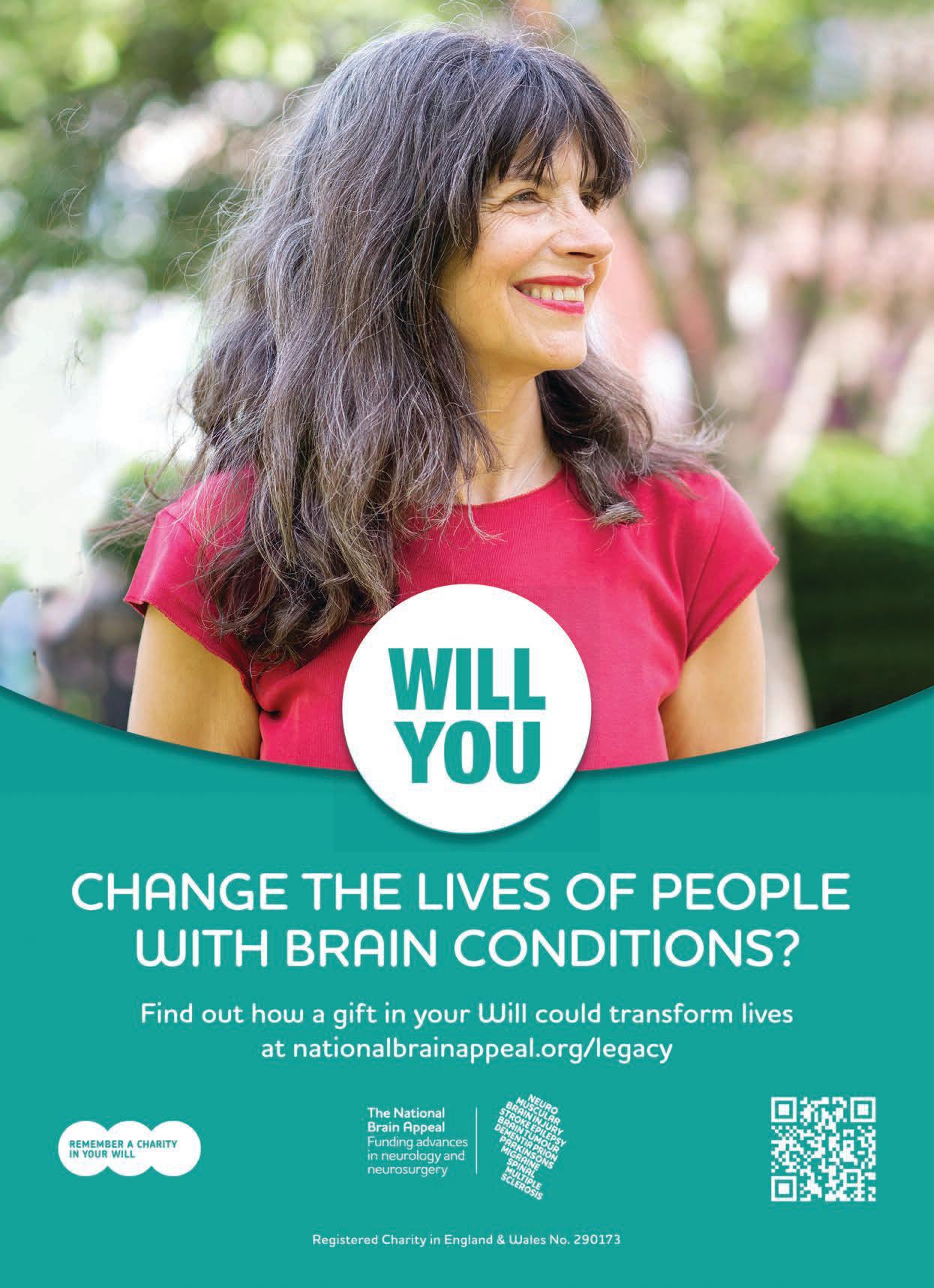
The week of 6-12 May was marked by Hospice UK as Dying Matters Week, encouraging everyone to reconsider the importance of difficult conversations concerning death or dying: shifting the dynamic from avoidance to initiation. Here, Liz Oti, registered manager of local home care service Sylvian Care Cherwell and West Oxfordshire, explains why it is crucial to engage in conversations around death and dying with our loved ones or relatives, providing some practical steps to help prepare.
[ DISCUSSING end-of-life plans with our loved ones may seem like a daunting or overwhelming task – but initiating those conversations can be easier than you think. The benefits of open and honest conversations far outweigh the negatives. So, why is it important?
Firstly, engaging in those conversations gives you and your family a greater understanding of what the end-of-life wishes of an individual are. That means everyone involved knows what their preferences are for their care, treatment and final arrangements – minimising potential conflict and confusion with other family members. By openly discussing dying, your relative can assert their autonomy and ensure their wishes are respected.
Conversations around death and dying can alleviate the stress and anxiety that arise, too. Knowing plans are in place provides a sense of peace and comfort, enabling everyone to focus on spending quality time together during their loved one’s final days – rather than being overwhelmed by uncertainty and logistical challenges.
Planning ahead is an integral reason why having conversations around death and dying is so crucial. Addressing financial arrangements and funeral preferences eases the burden on family members. It reduces the stress of making important decisions at a time of grief, ensuring the dignity and respect of the person who has passed away.
Talking about death and dying with your loved ones helps you and your family navigate the grieving process smoothly, giving you more closure and the knowledge that their wishes are being honoured, and providing a helping hand when dealing with their loss.
How to go about it and what to do to help?
We’ve established that having difficult conversations about death and dying is important and a crucial step to prepare for when a loved one or relative passes away. But how do you go about it? Here are

five practical steps to take to create a supportive and organised approach to endof-life planning:
• Safe and supportive environment –initiate conversations in an environment where everyone feels comfortable expressing their thoughts and feelings. Finding a suitable time and a place is key and sets the tone for openness and honesty.
• Writing a will – encourage your relative to write a will outlining their wishes for their assets, belongings and estate distribution. This not only helps to avoid potential conflicts among family members, but allows time to plan ahead, ensuring their wishes are carried out as intended.
• Organising important documents –following on from writing a will, assisting your relative to organise important documents like insurance policies and financial accounts can streamline the process when the time comes, alleviating stress at a difficult time.
• Seeking home and end-of-life care –discuss options for home care or end-of-life care with your loved ones. Research and explore the different options, ensuring their preferences and comfort are prioritised –being prepared provides peace of mind for yourself and your loved ones.
• Funeral arrangements – having conversations about this allows your loved one to express their wishes regarding funeral arrangements or their burial or cremation preferences, allowing them to be honoured and respected when they pass away.
By taking these practical steps and having open conversations about death and dying, you can help your relative feel supported, prepared and empowered to make decisions that align with their wishes and values. This approach can reduce stress and uncertainty for everyone involved, creating a sense of peace and dignity during a challenging time.
For me and the team at Sylvian Care Cherwell and West Oxfordshire, Dying Matters Week is very close to our heart. We’re keen to let people know that having those discussions isn’t as difficult as they may have previously thought. Being open and honest, and constructing a plan for endof-life situations, is the best course of action for you and your loved ones. q
• To find out more about Hospice UK visit www.hospiceuk.org


[THERE ARE OVER 130,000 people living with multiple sclerosis (MS) in the UK today; and nearly 7,000 newly-diagnosed cases each year.
Life with MS can be tough. It’s unpredictable and different for everyone. It’s often painful, exhausting and can cause problems for people in how they walk, move, see, think and feel. But thanks to support from kind people who donate to the MS Society, research into the disease has made huge leaps forward.
Nick Moberly, CEO of the MS Society, commented: “We still have a long way to go, but today there’s so much more we can do to treat symptoms, manage progression and ease anxiety.
“Right now we’re funding over 40 projects to help improve diagnosis and treatments. And our scientists are making some tremendous breakthroughs. There are groundbreaking discoveries and new knowledge on potential ways to repair myelin and protect nerves; and there are new projects and clinical trials underway. So there’s real momentum and hope on the horizon.
“We’re investing in research to help find treatments that could stop and, maybe one day, reverse the progression of MS. We can’t stop now. Our goal of stopping MS really is within reach. With a gift in your will, you can help make it a reality for the next generation.”
Raphael lives in London with his wife Lucy. They have a four-year-old daughter, Tali, and one-year-old son Asa. Raphael has lived with MS for many years and says the treatment he takes makes a huge difference. It helps him get on with his life with less disruption.
“I want to continue being a supportive father and role model to my kids, and husband to my wife,” he said. “To me, stopping MS would mean certainty over a large part of mine and my family’s future. It would take a huge weight off my mind.”
Nick Moberly continued: “If you’d like to be part of a community of people bringing us closer to stopping MS – whether that’s through providing information and support, continuing to fight for access to new drugs, or supporting vital future research – please think about including a gift to the MS Society when you next make or update your will.
“We understand that protecting the financial future of those you love is your main priority when writing a will. But we hope that, after taking care of your loved ones, you’ll consider including a gift that will transform the future of everyone affected by MS. No matter the size, it’s thanks to support from people leaving these special gifts that we’re getting closer to stopping MS and making sure future generations can live in a future free from its effects.
“With your support, the future is bright for people living with MS. Let’s finish the work we’ve started and stop MS together.” q
• For more information related to gifts in wills and the services the MS Society offers, call 020 8827 0374, email legacies@mssociety.org.uk or visit mssociety.org.uk/gifts-in-wills
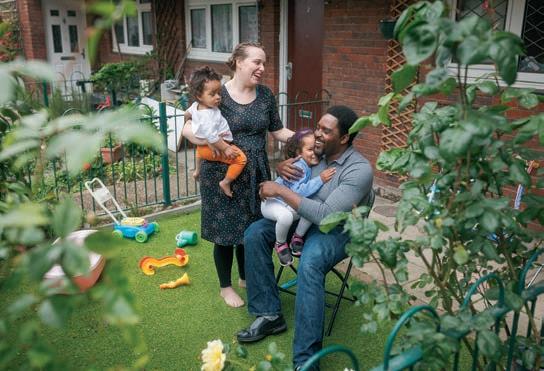
“ I am so grateful to people who help fuel research into this life-changing illness.



[THE SUFFOLK PUNCH TRUST is a registered charity, whose aim is to ensure the survival of the famous horse breed. It was founded in 2002 to save the historic Hollesley Bay Colony Stud.
That stud brought a rich legacy of equine and agricultural history which deserves to be saved for future generations to enjoy. The trust aims to achieve that through a successful breeding programme, supported by funding, education and the outreach facility of its visitor centre.
The Suffolk Punch is the oldest English breed of working horse, dating from the 16th century. Every Suffolk horse can be traced back to a stallion, known as Crisp’s Horse of Ufford, foaled in 1768. The Suffolk horse was developed for farm work and gained popularity during the early 20th century. As agriculture became mechanised, however, the numbers fell and the breed almost disappeared completely.
The aim of the trust is to help save the iconic breed from extinction through its established breeding programme. It is working towards increasing the numbers of horses through normal breeding processes and an artificial insemination programme.
It also works to raise public awareness and is training a new generation of professionals to work with and understand the needs of the breed. The Suffolk Punch is incredibly versatile and is now often employed in forestry and ridden work.
The Suffolk Punch Trust can only continue its work with the help of donations and legacies. As David Clarke, one of the trust’s directors, explained: “Your legacy, large or small, will make a huge difference to the work we carry out, enabling us to care for our horses and continue the breeding programme to secure this wonderful breed.” q

[
now live in a new home at Sink Farm in
Suffolk and are cared for alongside the
Sink Farm is the colony stud for the Suffolk Punch Trust charity, who continue their important and essential work in preserving this unique breed. q
• For more information on either charity please contact Tracey Pettitt, stud manager or David Clarke, finance director, on 07768 025128.
Heartbeat Homes for Horses, Sink Farm, St David’s Lane, Hollesley, Woodbridge, Suffolk IP12 3JR
[DATA RELEASED ON 7 MAY by Legacy Futures has revealed that charity sector investment in legacy fundraising has grown considerably in recent years, almost certainly reflecting both growing awareness of the importance of legacies in charity sustainability and hard work in securing budget for legacy marketing.
Legacy Marketing Benchmarks is a biannual benchmarking programme involving around 30 of the largest charities by legacy income. They have shared a summary of the project findings with the wider sector.
Key stats include:
• 6.2% of all fundraising spend is now focused on legacies – an
• increase of 31% on the previous year
• 88% of that marketing investment is spent on new donor
• acquisition and free wills
• Legacy marketing return on investment is 1:15
While it’s good news that investment levels in legacy have increased, when put into perspective the number is still a relatively small proportion of overall fundraising spend when legacy returns can be substantial. The charities who submitted data to the research project spent £1 on marketing for every £35 of legacy income and had just one staff member for every £3m of legacy income.
Overall return on investment for legacy marketing across the sector remains high, at around £15 per £1 spent. That calculation takes into account the negative impact of a delayed return, as legacy income is a mid to long-term investment, and the potential uplift of silent
legators – those who don’t make their pledges known to the charities they support.
Recruiting new legacy audiences is a priority
The research also showed that recruiting new legacy audiences is where the majority of the investment goes. Acquisition marketing and free will schemes together make up for 88% of legacy marketing spend, whereas stewardship accounts for just 5% of spend and awareness raising 6%. It is worth noting, however, that stewardship activities take up over a third of staff time.
Ashley Rowthorn, CEO of Legacy Futures, explained: “The amount of investment going into legacies today compared to a decade ago is huge and very welcomed after years of underinvestment. In this new era of high-volume legacy conversation, charities need to make sure they are being heard; and that doesn't just mean shouting louder. The tone and quality of communication is just as important, nurturing long-lasting relationships with like-minded donors. For those still not investing properly in legacies, this should be a wake-up call to start now.”
The briefing summarises the top-level findings from a benchmarking project that was designed to help charities better understand the world of legacy marketing, track their performance across a range of marketing metrics and to provide them with data to build a robust business case for legacy investment.
The document can be downloaded from www.legacyfutures.com q


[ JOANNA LUMLEY, Patron of The Respite Association (TRA), recently paid this tribute to carers: “Carers are my heroes: caring 24/7, week-in and week-out, often for years on end, with no breaks or holidays and no complaints.”
Across the country there are thousands of unpaid carers; and since its formation in 2001 TRA has been supporting them to get a desperately needed break.
John Turner, one of the charity’s two part-time staff, explained: “It doesn’t take a great deal to have an enormous impact on the lives of carers. They don’t see what they are doing as a burden because they are caring for someone that they love; but they just need a little rest.”
“One lady, whose son is on the autistic spectrum, explained that he only sleeps for two hours per night, so that is all the sleep she gets, too. That lady just wanted a normal night’s sleep to catch up – while a gentleman in his seventies, caring for his wife who has dementia, wanted a weekend so he could go to his granddaughter’s first piano recital.”
TRA also have three holiday facilities - in Cornwall, Wales and Yorkshire - where they give carers a week-long break by the seaside. A carer who had a break in the charity’s caravan at Rhyl


wrote: “We had the most amazing time on holiday – gutted to be home in fact. Whilst I was there I couldn't help thinking of you and what an amazing opportunity you gave us. Me and my family are extremely grateful and always will be.
“The caravan was filled with lots of board games and books for both adults and children and we loved it. I usually don’t have time to read with my children or sit and do a jigsaw with them, but on holiday I did – everyday. And instead of dishing out medication of an evening I spent that time in the park with my family.
“It was so good to just be out in the fresh air and actually taking in the sky! You allowed me to have uninterrupted quality time with my children and for that I’m truly thankful.”
John explained “TRA offers something that you and I take for granted: a little bit of normality; enough to recharge the batteries and carry on caring. We have been incredibly fortunate that people have been very generous to us over the years, which has helped us to support thousands of carers and their families, and has provided a legacy of hope.” q
[ PROMOTING AND ASSISTING in access to justice in the Family Court is the aim of Parenting Together, a charity set up by former youth worker Gerry Hannah.
Gerry points out suicide is the most common cause of death among young people – often prompted by the depression caused by family break-up. He believes that in many cases the break-up of the family is avoidable if parents are able to present their version of events.
Said Gerry: “British Family Courts sit in private and they convict parents merely on the ‘balance of probability’. In some cases a judge is persuaded to make a misinformed decision based on race, gender, heritage, beliefs and social status – often causing serious depression which can have lethal consequences.”

Gerry formed his association with humanitarian experts and professionals to ensure low-income, disadvantaged parents involved with social services or Family Court proceedings receive fair and equal justice.
He added: “We mostly provide specialist legal services, advocacy and reports for disadvantaged parents in Family Court proceedings. Our experts, professionals and associate solicitors often work pro
bono to help us resolve exploitation and unlawful abuse of the family law and child protection systems. We framed our projects on the government’s Every Child Matters report, published in 2003, that recommended engaging families in the care and protection of children.”
He points to cases of parents with learning difficulties asking people on social media for advice when they cannot understand the legalese, acronyms and procedures.
“They are usually misguided, posting views and comments that go against them in court. Their social media ‘friends’ are often predators who exploit single parents with young children. We recently submitted evidence to the CPS against a few of these sexual predators targeting our vulnerable parents and their children.”
The current project is a continuation of Honeypot Families , a work-in-progress study comparing families in the safest happiest regions of the UK with families in what Gerry describes as ‘the most dangerous city in Europe’.
“We concluded that Judeo-Christian families functioned efficiently to provide the best outcomes for everyone because they are based on a mutually agreed contract where adults vow to love, care and respect each other until death.” q

[ FOLLOWING THE PRIME MINISTER’S surprise announcement of a general election on 4 July, a number of organisations issued advice to charities on how to engage in campaigning around the election and the rules governing them.
The National Council for Voluntary Organisations (NCVO) published helpful guidance on how to plan for the forthcoming election and the kind of activity charities can engage in over the coming weeks. The charities umbrella organisation came up with some key things they can do.
Use the opportunity to get your voice heard
Elections provide an important opportunity to discuss the major issues of the day, so some charities will find themselves at the centre of debate.
That can create challenges, says NCVO, but has the potential to give charities a much bigger platform than they might normally have. Make sure you have strong messaging that can get your points across to that unusually attentive audience.
Check the rules so you can campaign with confidence
Charities can sometimes be wary of the risks associated with campaigning, but they can do many things to campaign and influence policy within the rules.
With the Association of Chief Executives of Voluntary Organisations (ACEVO), NCVO has set out what the guidance from the Charity Commission and Electoral Commission say and what charities need to think about when planning election activity.
The guidance covers issues such as:
• What is campaigning?
• Charity campaigning law
• Electoral law
• Joint campaigning
• Digital imprints
There is also a list of further resources offering guidance. They are:
• The Charity Commission’s guidance on campaigning and political
• activity.
• The Electoral Commission’s guidance for non-party campaigners in
• UK parliamentary general elections.
• Stone King’s Q&A on charity and election law for campaigners.
• Bates Wells's guide to general election 2024 campaigning.
• Bond’s collection of election campaigning resources.
• Lloyds Bank Foundation’s election guide for small and local
• charities.
The guidance can be downloaded from www.ncvo.org.uk/help-andguidance/running-a-charity/political-campaigning/
Many charities will be busy updating their plans in the next few days and weeks. However, as the campaign goes on, they may find they have less to do as the political parties will only be focused on what’s happening in the campaign.
That is a good time to plan what you will do after the election and research likely new MPs. Even if no seats change hands, over 100 MPs will be standing down. As a result, next year represents a really good opportunity to build relationships with new MPs.
For national charities, it’s also a great time to think about:
• How you’re going to approach the new government
• What your influencing priorities will be and plan activities for the
• weeks after 4 July.
The NCVO and ACEVO manifesto will be published in the coming weeks, setting out what they think the next government’s priorities should be for the voluntary sector.
The chair of the Charity Commission, Orlando Fraser KC, addressed trustees directly. In a statement on the commission’s website he wrote: “Charities may give support to or raise concerns about specific policies advocated by political parties, but as trustees and leaders of charities you have an important responsibility to ensure that everything you do, and every decision you make, helps you further your charity’s purposes and is in the best interests of your charity.
“Charities are required to be independent and cannot have political purposes, and this is important for public trust in charities. As such, charities must never stray into party politics – they must never promote, or be seen to promote, a political party or candidate.
“As trustees and charity leaders you must protect your charity’s reputation and not allow your organisation to be used as a vehicle for the expression of the party-political views of any individual trustee, employee, political party or candidate.”
He went on to reassure trustees that the commission would act in a fair and just manner.
“I want to assure you that, as chair of the commission, I understand the importance of our role during this time. Complaints to the regulator are one certainty in an otherwise uncertain period of heightened political volatility. But in regulating charities in line with the legal framework I assure you that – whilst all complaints will be considered carefully – I will not allow the commission to be misused or weaponised by any particular side of the public debate, whether it be by politicians, the media or indeed the sector itself.” q



[ THE MISSION of the Isle of Wight Donkey Sanctuary is to provide refuge, exceptional care and new beginnings for donkeys and other equines in need. Animals come to the sanctuary for a variety of reasons – they might have lost their grazing, been maltreated or rescued from slaughter. The sanctuary commits to caring for all its animals for the rest of their lives.
Susan McCall, CEO of the Isle of Wight Donkey Sanctuary, said: “Our island sanctuary is unique. We provide love and care for all our animals and it’s important to recognise that the relationship between humans and donkeys is mutually beneficial. It’s not just what we do for our donkeys, but what donkeys can do for people.
“Simply being in their presence can bring so much joy and comfort. We work with many people to develop skills and confidence or by simply helping to provide a loving connection.
“To fund our work, we rely on the kindness people show in leaving a gift in their will. These donations are vital to our work. Without them, we simply wouldn’t exist.”
Previous gifts have helped build new barns, create field shelters and ensure that every animal at the sanctuary receives the very best care available.
Susan added: “Gifts in wills and legacies mean we can guarantee a happy and healthy life for the animals under our care. This compassion leaves behind a legacy of love not only for our donkeys but for those whose lives they touch.” q

Since its founding in 1883, Edinburgh Dog and Cat Home has relied almost entirely on gifts in wills to keep its doors open.
The Home costs over £2m a year to run, and in the absence of any regular government funding, they are left almost completely dependent on donations and fundraising initiatives to keep going.
One of the most powerful ways that the community has supported the charity is by leaving gifts in their wills. An astounding one in three animals that reside with them each year has had their care funded by legacies.
Head of Fundraising, Gillian MacAulay explained: “We simply couldn’t keep going without this lifeline and there really are no words to describe what it means to us when we discover that someone has made that decision to include us in their will.
“This support can transform the lives of the hundreds of vulnerable animals who need our help each year – for as long as they need it. By leaving a gift, your love and compassion for animals can live on.”
To find out how to make a lasting contribution, please visit edch.org.uk/legacies or contact Gillian MacAulay, Head of Fundraising on 0131 669 5331 or by emailing fundraising@edch.org.uk

[THE FIRST OF THE CHANGES to charity law contained in the Charities (Regulation and Administration) (Scotland) Act 2023 came into effect on 1 April.
The 2023 Act gives the Scottish Charity Regulator (OSCR) the power to remove charities from the Scottish Charity Register that have failed to submit accounts on time and failed to engage with OSCR about putting that breach of trustee duties right.
Every year, charities must submit accounts to OSCR within nine months of their financial year end. If they fail to do that, OSCR, members of the public and potential beneficiaries and donors cannot be assured that those charities are effectively using charity resources for charitable purposes.
The Act also gives OSCR a number of new powers to help it work more effectively to protect charities and their assets.
They include the power to direct charities to take particular actions: That will allow it to compel charities to make changes and improvements that need to be made. That positive power will allow OSCR to respond flexibly and appropriately to the wide range of situations it encounters.
The OSCR said in a statement: “We want to focus on achieving beneficial outcomes from the use of this power and will use it where appropriate. The power does not relieve charity trustees from their responsibilities and legal duties in running the charity – we will not for example use it to take sides in a dispute.”
The power to appoint interim trustees is also one of the new powers.
Said the OSCR: “Using this power, we will be able to help charities where the number of charity trustees in place is less than the number needed to appoint more trustees and the charity’s governing document doesn’t specify how to deal with that situation. Specific criteria must be met to allow us to do this. More guidance is provided.”
The OSCR also has the power to inquire into former charities and former charity trustees, extending the reach it has to make inquiries into organisations that are no longer charities and individuals who were previously charity trustees. That extension of powers will enhance the OSCR’s ability to deal with situations and issues that may cause concern to the public.
From now, OSCR must refuse an application to be registered as a charity from organisations that have no or a negligible connection with Scotland. Experience so far indicates that it will not be an issue for the overwhelming majority of applicants. Most of them are Scottish Charitable Incorporated Organisations, which in any case have always been required to have a principal office address in Scotland. However, the new measure will ensure that OSCR can deal with issues where they arise with organisations applying under other legal forms.
In addition to the changes above, the 2023 Act has made minor changes to simplify interactions between charities and OSCR and provide more flexibility. q

[HESSILHEAD WILDLIFE RESCUE TRUST is situated near Beith, in North Ayrshire. It was set up as a charity in 1986, although its founders Andy and Gay had been caring for injured and orphaned wildlife since 1970, when they rescued a fox cub from a gamekeeper and his dogs. As the number of casualties increased year on year, Andy and Gay needed financial and practical help.
Once the trust was set up, new aviaries and enclosures were built. A membership scheme proved popular and many volunteers were recruited. The centre now occupies a 20-acre site, including woodland, marsh and open water. That gives a variety of release sites for its patients.
Approximately 3,500 wildlife casualties are now treated each year, with the aim of returning them to the wild. Among the many hedgehogs, foxes and familiar garden birds there are deer, otters, badgers and seals. All have been rescued and are rehabilitated. In addition, swans are treated regularly, along with buzzards, peregrines, herons and sea birds.
The centre operates a 24-hour rescue service and there are more than 60 enclosures and aviaries, a hedgehog hospital, a seal/swan unit and intensive care facility. It also offers training courses on the handling, care and treatment of wildlife casualties.
Spring and summer are especially busy, with hundreds of nestling birds being hand reared. Care is taken to rear all youngsters with minimum human contact. That prevents wild birds and mammals becoming too used to people, so giving them a good chance of survival in the wild.
Hessilhead is primarily a voluntary organisation. Its volunteers help in many ways: fundraising, building and maintenance, driving patients to the centre and daily cleaning and feeding. q



[ESTABLISHED IN 2001, the Suffolk Owl Sanctuary – known, appropriately, as S.O.S. – operates a comprehensive facility for the rescue, care and rehabilitation of owls across East Anglia. It also promotes the need for the conservation of endangered owl species throughout the UK with its Saving Britain's Owls initiative.
The S.O.S. owl and raptor hospital at Stonham Aspal is unique in the region. It is specially equipped for the care and treatment of the many injured wild owls and other birds of prey it receives every year as a result of road traffic accidents, mishaps, starvation, trauma, disease, poisoning and sometimes even shooting or trapping.
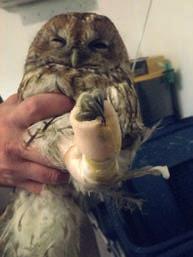
Many of the birds can be given a recuperative, short-term pick-me-up before being re-released into the wild. Those that are more seriously injured but stand a chance of recovery are given medical aid and/or surgery, as determined by their vet. The birds are then allowed space and time to fully recuperate in one of the secluded recovery aviaries, before being carefully returned to the wild.
S.O.S. operates a wild owl nest box scheme that includes building, locating, curating, and repairing environmentally friendly nest boxes in appropriate locations to replace the gradual erosion of natural nesting sites.
S.O.S. is funded purely by donations and as a small charity, the legacies it receives play an important role in enabling it to sustain the resources needed to actively promote the conservation of owls and other birds of prey throughout the UK. q
[LEGACIES MEAN SO much to the team at Last Chance Animal Rescue. These wonderful gifts have helped them to rescue, rehabilitate and re-home so many abandoned, abused and unwanted dogs, puppies, cats, kittens, rabbits and guinea pigs who otherwise would have had no future.
The charity understand the wishes of its kind benefactors who have considered them in their Wills. A spokesperson said: “We know they want their generous gift to us to be used directly to save lives, provide the very best of care and to find loving homes.

“Legacies really do provide the gift of life and Last Chance Animal Rescue can now, after much planning and prudent use of funds, offer our life saving services to so many more needy pets. We are delighted to announce we now have a second rescue and rehoming centre in Kent, giving hope and a true last chance to so many.
“Sadly we cannot thank those who have enabled this wonderful achievement but are extremely grateful to all those who are currently considering helping us now and in the future to continue our work.”
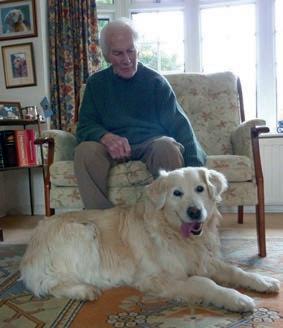
[ IN MARCH the Charity Commission shared early findings from its annual sector survey, revealing that 42% of trustees surveyed said their charity experienced poor service from their banks in the previous 12 months.
Of those who responded to the questionnaire, 6% confirmed that they had experienced account freezes or being blocked out over the past year, and 7% of respondents reported that their bank had lost their records.
Other findings from the survey include:
• 32% of respondents faced issues when trying to update their
• charity’s contact details or signatories
• 18% had difficulty trying to open a new bank account
• 15% found it challenging to comply with identity requirements set by
• their bank
• 14% found it difficult to understand what their bank requires of them
Those figures include charities experiencing more than one issue.
The findings came as the Charity Commission renewed its calls for urgent action to be taken by the UK banking sector to improve the service it offers to charities. The regulator says inadequate banking services result in three key concerns:
• Risks to the provision of charitable services, resulting from charities
• being unable to meet financial obligations, such as paying staff
• Unsafe banking and financial practices, for example the use of
• trustees’ personal bank accounts to meet financial obligations: a
• direct contravention of the commission’s guidance
• Longer-term impact on morale of volunteer trustees – anecdotal
• evidence demonstrates some trustees have resigned over
• frustrations around disruptive banking services
The survey was based on a sample of charity trustees from the Charity Commission’s online Register of Charities. It was commissioned by the regulator and carried out by research partner BMG. A total of 2,541 responses were received via an online survey between 2 and 12 February.
The commission quoted a number of examples of impacts on charities.
One charity experienced major disruption when their bank froze their account with little notice after asking for scanned identification from more than 60 trustees, many of whom were elderly with no access to internet banking, while another charity’s account was frozen after a bed-bound trustee with cancer was unable to sign a document, despite having the signatures of dozens of other trustees.
In another case a charity’s bank account was closed suddenly while its CEO was overseas delivering aid. That held up a major grant which will enable the charity to expand its work supporting women’s mental health in a deprived community.
Helen Stephenson, chief executive of the Charity Commission, commented: “I’m shocked but not surprised by these new figures, which offer undeniable evidence of the extent and impact of the appalling service charities receive from some banks. It is simply not good enough that volunteer trustees, who are giving of their free time to serve society, are faced with such unnecessary challenges in managing their charities’ money.
“We have worked behind the scenes with banks to improve the service they provide to charities. So far, I have been disappointed with their response. I hope this new research sends a message to the CEOs of high street banks that change is needed now.”
In November last year the Charity Commission, alongside sister regulators in Northern Ireland and Scotland, issued an open letter to all UK high street banks, highlighting the ‘substandard’ service charities receive. The letter warned how ‘inadequate banking provision drives charities to rely on unsafe practices’ and set out key improvements the regulators want to see. That includes

making processes simpler and improving staff training on how charities operate.
The latest data released by the regulator are early extracts of the survey’s findings. It will be published in full later in the spring. q
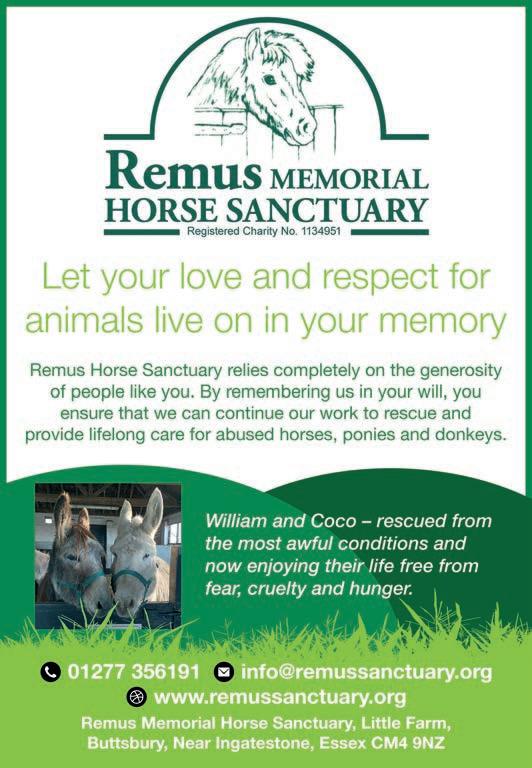

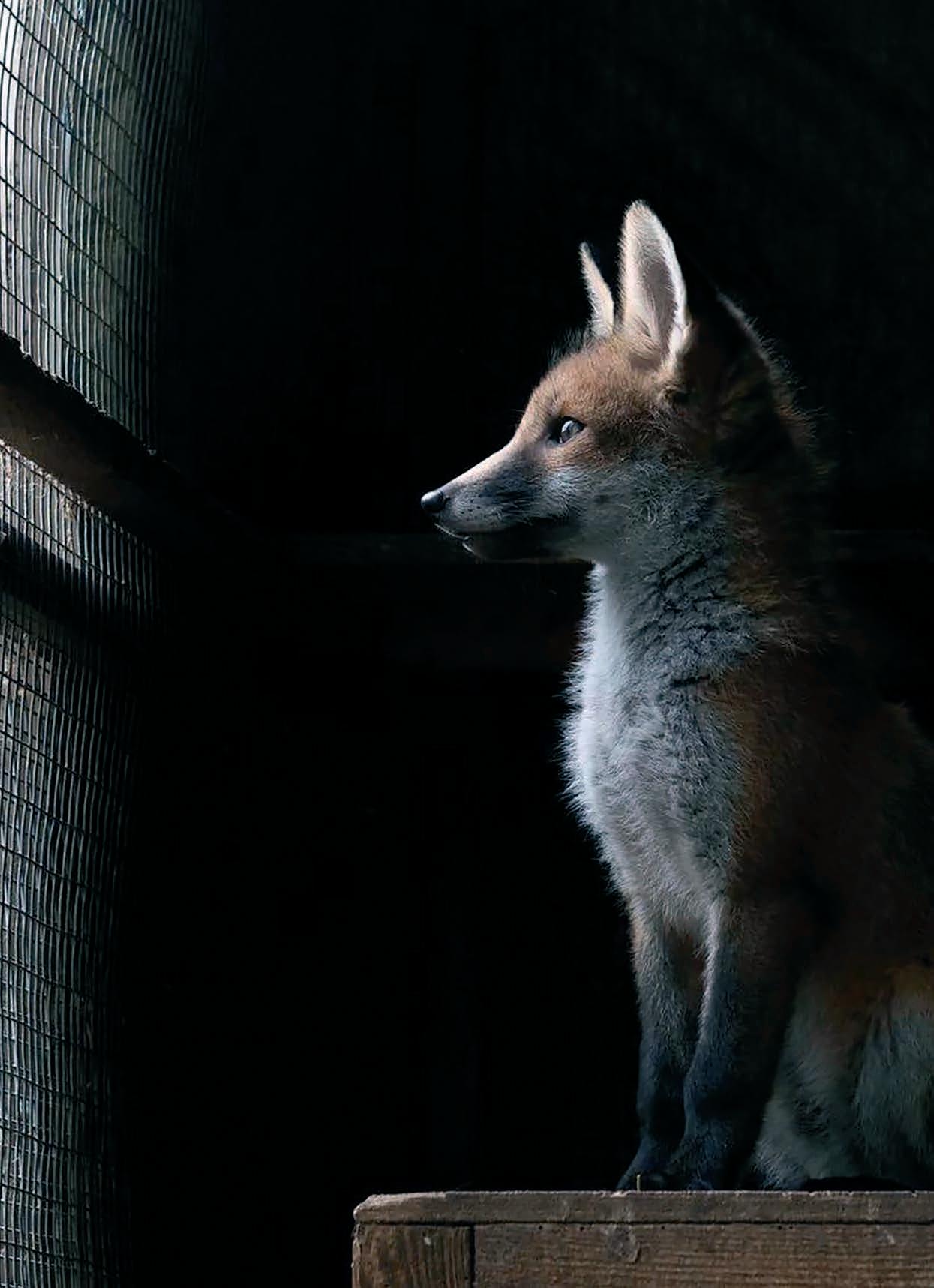
[IT WOULD BE TEMPTING to try to explain all that is The Fox Project, but that would look a little like a shopping list: wildlife information bureau, humane fox deterrence consultancy, wildlife ambulance service, wildlife hospital etc.
Instead, it would be more straightforward to concerntrate on what’s going on right now, as we enter the annual UK red fox breeding season, with an expectation of anything up to 300 sick, injured and orphaned fox cubs being receieved by the Fox Project. How does that work?
Wynn was one of the first cubs the project received in 2021. He is pictured gazing thoughtfully out of his pen at the setting sun, perhaps quietly wondering how he can get out into the big, wide world and do what he wants, rather than what we want.
Founder of The Fox Project Trevor Williams takes up the story: “Wynn was picked up next to a dead sibling by a passing dog walker and we assumed they had crawled out of the den in search of a mother that, for whatever reason, had failed to return. He was a keen bottle feeder, and because baby animals need the company and warmth of others, he was grouped with Wendell, Wilfred, Calvin and Bertie.
“Cubs grow fast and a brooder will only hold them for so long before their accommodation needs to be upgraded to steel vet cages. And they, too, are soon inadequate for curious, active youngsters who are developing speed and agility – albeit wobbly speed and agility!
“The next step was day release in a two-storey chicken run and back in the warm at night for a bedtime bottle and a bowl of dog food. They loved that! And then they were moved to a larger foster pen, where muscles could develop and they could feel the weather.
“As soon as Wynn and Co were weaned off the bottle, the bond with their feeder was broken and they were transferred to one of our team of fosterers. These volunteers have pens in their gardens where they can look after the needs of a litter of cubs without getting directly involved with them.
“And that is where the serious work begins in encouraging cubs to revert to wild in preparation for late summer release. Given all the changes, our cubs should be growing suspicious of people in general; and their first instinct when a fosterer approaches is to run into the hutch provided. If they begin to get ‘waggy’ with the fosterer, we move them to another. And we keep doing that right through the summer.
“From mid-June, we start to move them onto pre-arranged rehab sites – no more than five cubs per site. Those are predominantly rural: often farms and smallholdings.”
The cubs are now the responsibility of the rehabber that owns the property. Their job is to feed, water and clean out the pen and never to speak. A cautious cub is a cub that will live the longest: if you’ve made a cub tame, you’ve undermined their potential for a safe and long life.
After four to six weeks on site the cubs are used to the sights, sounds and smells of every other animal in the area and vice versa. That means they can safely be released without danger of attack. Come the night of release, the rehabber simply leaves the door open and walks away.
Trevor continued: “Timing for this final part of the procedure is governed by nature. Just as the breeding season fluctuates a little every year, so does natural dispersal, when wild-raised cubs – by now around five months old – will fan out from their home territory to locate their own: a vital process to avoid in-breeding and necessary if they’re ultimately to find a mate. Release of our cubs is timed to coincide with that point.”
Wynn and his chums were released from a smallholding in East Sussex. Initially, they all returned for support feeding, but it’s seldom needed for long. As they begin to use the instincts nature provided them with, the cubs return less and less frequently.
“When they no longer return,” said Trevor, “we must hope they’re doing well. And we generally know they are, because we often see them around for months, or even years. Not that it’s any of our business. We’ve given them that all-important second chance and whatever befalls them, good or bad, is down to them.” q


[THE ANIMAL RESCUE SECTOR is facing unprecedented challenges at the moment. According to dog rescue charity Hope rescue: “More dogs are coming through our doors than ever before, and more owners are struggling to cope and seeking our help. It’s non-stop, but we don’t stop.
“Our experienced team meets the challenges every day, providing the care, compassion and commitment that transforms the lives of vulnerable dogs.

“Our work to help stray, unwanted and abandoned dogs continues. It’s not an option to reduce services and put the lives and welfare of the most vulnerable dogs at risk. Too many dogs and their owners are in desperate need.
“We currently have 167 dogs in our care across the rescue centre and our foster homes. This includes stray dogs abandoned by their owners, dogs relinquished by their owners and dogs that have been seized or signed over from illegal breeders. We have never been this busy in our entire 19-year history and it really is our most challenging time.
“We won’t stop transforming the lives of dogs and desperate owners in our communities – we can’t stop. Because every day, for every dog, there’s hope.” q
• Find out more about Hope Rescue at www.hoperescue.org.uk or get in touch via enquiries@hoperescue.org.uk
[THE HORSE RESCUE FUND was founded at a time when many deliveries were still being carried out using horses – which at that time were destined for a bleak fate after they finished their working life
That history explains why, as well as rescuing horses, ponies and donkeys in desperate need, the fund has campaigned for improvements at horse sales, in transit and for equine welfare generally. Indeed, they often work in conjunction with their fellow organisations on some of the largest equine welfare cases.
The charity’s byline is: Rescue, Rehabilitate, Rehome
A spokesperson for the charity commented: “All of our rescued horses are treated as individuals and – being one of the smaller welfare charities – our staff get to know the likes, dislikes and foibles of each horse in our care, so their treatment can be personally tailored to their needs.”
After rehabilitation and when they are fit, their animals are placed on loan in private adoptive homes to lead happy, useful lives. Some have gone on to win at prestigious shows, and even appeared on television!
They continued: “We never sell them, so we are able to ensure their wellbeing for the rest of their lives; and if their loaners’ circumstances change, they can always be returned to us. Horses do so much for humans – we try to repay some of that debt; they cannot speak, but we can.”
Funds are urgently needed to continue that work: legacies, covenants, individual donations or corporate funding are all most welcome. Supporters receive a biannual newsletter keeping them up to date with all the happenings on the yard at Woodstock Farm in Norfolk.
For more information visit the website at www.horserescuefund.org.uk or email info@horserescuefund.org.uk q
[HARD-PRESSED CHARITIES are missing out on much-needed income as fewer employees donate through Payroll Giving, research by the Charities Aid Foundation (CAF) has found. The research found that more than half (59%) of people have not heard of the scheme, which allows employees to donate to charity via their salary before tax.
Since its launch in 1987 Payroll Giving has been through periods of rapid growth, particularly in the late 1990s. But the total amount donated to charities via the scheme fell 7% year-on-year from £137m in 2021 to £128m in 2022, the most recent year for which data is available.
Indeed, the latest data shows the number of employees using Payroll Giving has fallen by 13% since 2020 to just 516,000 employees. Meanwhile, there are currently 30 million people on PAYE who could be eligible to give through Payroll Giving.
Employers have the option to provide staff with a Payroll Giving scheme, also known as Give As You Earn, which works in a similar way to salary sacrifice by providing employees with a simple and taxefficient way to make regular donations to charities.
Despite the benefits for a responsible business, fewer employers are now offering Payroll Giving to their staff. Only around 4,000 organisations currently provide the valuable benefit, including the likes of Tesco, AstraZeneca and government departments.
However, there are clear opportunities to turn the downward trend around by increasing knowledge and understanding among the general public.
CAF’s research also shows the opportunity is greatest among the Millennial generation of employees and jobseekers, who increasingly want to work for a company with a social purpose. Younger employees are the most likely to say they would use a Payroll Giving scheme (36% of 16-34-year-olds). Although affordability can be seen as a barrier to giving, employers can also take steps to encourage take-up such as making it easy to opt in and out, and matching donations.
Neil Heslop OBE, chief executive of the Charities Aid Foundation, said: “It’s concerning that the number of employers and employees taking advantage of this valuable benefit is declining. It provides an incredibly powerful platform for companies to support their giving in the workplace and can be a lifeline for charities at a time when their incomes are squeezed.
“That’s why we would like to see a renewed and joined-up focus on promoting Payroll Giving from providers, employers and the government. For individuals who can afford to give, it’s a simple way to donate regularly, or even on an ad-hoc basis, to causes that matter to you.”
Terry Stokes, head of payroll giving at Barnardo’s, added: “Payroll Giving offers a vital source of income to Barnardo’s. Our services are facing even greater demand against a backdrop of increased child poverty, so the consistent reliable income we get from Payroll Giving enables us to better plan where we need to allocate our resources.
“Importantly for charities, with the tax relief coming at point of donation, it removes the need to claim Gift Aid at a later date.” q

[MAYBE YOU LOVE ANIMALS: maybe you have given a loving home to dogs or cats in need. Perhaps the suffering of animals through neglect, abuse or abandonment causes you pain. If you would like to help create a world that is kinder to all creatures, remembering Paws2Rescue in your will means you will help to alleviate the suffering of animals for years to come.
The mission Of Paws2Rescue is simple: to help animals in need wherever they are. As they are entirely staffed by volunteers, every penny they raise enables them to fulfil that mission over and over again.
Paws2Rescue’s Alison Standbridge explained: “Although we are a UK-based charity, we recognise that too many animals overseas suffer appalling neglect and cruelty. That’s why, as well as finding loving UK homes for unwanted dogs and cats, we undertake a variety of international projects to reduce the suffering of animals, with a particular focus on Romania and Moldova –countries where animals continue to suffer the most distressing abuses.
“We aim to alleviate the day-to-day misery of these unfortunate animals by meeting their basic needs – food, medical treatment and sanctuary – and by supporting shelters in rural areas where resources are desperately needed.”
But the key to truly ending the misery is to tackle its root causes. Therefore, Paws2Rescue also provide free neutering services for both stray and owned animals, encouraging owners to take responsibility for their pets’ health by preventing unwanted litters of kittens and puppies.
Their Veterinary Scholarship Programme funds young Roma before and after being rescued
people through their university studies to encourage more local vets to work in rural areas in Romania where the need is greatest.
Alison continued: “Education is crucial to our mission: if future generations are brought up to hold the same antiquated, cruel attitudes towards animals as many of their elders, then the horrible abuses will continue. To break this negative cycle, our successful schools programme uses purpose-made educational materials to foster compassion, teaching children to love and respect all living things.
“So, although our current aim may be to help animals in need wherever they are, our dream is to create a world where no more animals need our help.
“By leaving a legacy to Paws2Rescue, no matter how small, you can rest assured every penny of your kind donation will be helping dogs, cats and other animals in desperate circumstances both now and in the future. Thank you.” q



[IN THE TAX YEAR ending April 2022, it was reported that Gift Aid brought an additional £1.3bn into the sector. Last year, HMRC revealed that the figure had increased to £1.6bn. Yet despite all that, as much as £560m of Gift Aid could still be going unclaimed each year.
That’s money that could be used to mobilise charities’ mission, so no organisation can afford to let the process slip.
Access Workspace for Charities has put together a handy guide to help charities get to grips with Gift Aid donations.
The guide explains: “Gift Aid was launched in 1990 as an incentive to enable tax-effective giving. Every time an eligible individual donates to your charity, you can claim an additional 25% on that donation – this is your ‘gift’. That means for every £1 donated, your organisation can claim 25p in Gift Aid. It’s a huge financial boost, and one of the best ways to stretch the value of individual donations for charities and non-profits.”

The Charity Finance Group (CFG) holds an annual Gift Aid Awareness Day, which this year will be held on 3 October. It is also an opportunity for charities to join CFG’s #TickTheBox campaign.
Gift Aid Awareness Day and the #TickTheBox campaign provide an opportunity for charities across the UK increase engagement with Gift Aid by:
• Sharing the enormous impact Gift Aid has on beneficiaries and
• communities
• Promoting public understanding of Gift Aid
• Showing why it is so important to #TickTheBox

[WITH ANIMAL WELFARE at the heart of everything Ferne Animal Sanctuary does, any animal passing through their gates can be assured of love and compassion throughout the rest of its life.
Much of the support their animals receive – including food, a warm bed and veterinary care – is only made possible thanks to the generosity and support of those who believe that every animal deserves a second chance. Those who are dedicated to securing brighter futures for animals and providing them with the opportunity to feel happy, safe and loved.
Your support will make a difference to animals in need. By leaving a gift in your will to Ferne Animal Sanctuary, you will provide a vital safety net to unwanted animals, giving them a second chance of happiness.
You will also create a lasting legacy of your unwavering compassion and commitment to the wellbeing of animals. Animals who, through no fault of their own, find themselves in need of a helping hand, some care and attention and a safe, loving home. q
How can you get involved?
Since 2018 charities across the UK have been taking to social media for one day every October to share the #TickTheBox message with donors, supporters, volunteers and others. When a charity gets involved, it is also a chance to recognise their supporters’ and donors’ generosity, celebrate their impact and get donors excited about what more we can all achieve if they #TickTheBox.
Charity volunteers and staff can get involved by spending Gift Aid Awareness Day talking to supporters about what Gift Aid means to them and why it is more important than ever to #TickTheBox.
For Gift Aid Awareness Day, CFG will be providing social media toolkits that will contain everything an organisation needs to get involved on the day and running a Gift Aid Awareness Day webinar.
CFG are also looking for charities to tell them more about new ways it can support them to make 2024 Gift Aid Awareness Day the most impactful so far.
In its promotional release CFG said: “We want this year's campaign to be co-created with charities across the UK. We would love to hear from your organisation to see how we can make this year's Gift Aid Awareness Day bigger, better and more impactful than before.”
By filling in the enquiry form at https://cfg.org.uk/news/cta2024 charities can register their interest to be kept up to date with CFG’s Gift Aid Awareness Day resources and events. q




[INTRODUCING chimpanzee brothers Fergus and Twmi – they are the reason Wales Ape & Monkey Sanctuary began back in 1998.
Even though they are brothers, their personalities are quite different! Fergus (36) is very mischievous and loves the camera – and apart from hoarding bananas and eating onions, winding the other chimps up, he loves to be in every single photo you try to take.
Twmi (38) is more cool, calm and collected. He likes to oversee and watch what the other chimps are getting up to but also makes his presence known if needed. He loves head bopping to Queen – his favourite band –



and loves his food. Iceberg lettuce and grapes are a firm favourite.
Fergus and Twmi have a great relationship with Nakima, Bili and Ronnie, the other chimps they live with. You will see them on sunny days relaxing in their hammocks and grooming each other.
The brothers are both very popular amongst visitors. Children often get smiles from Fergus which makes their day! q
• For more info call 01639 730276, email info@ape-monkey-rescue.org.uk or visit the website at www.ape-monkey-rescue.org.uk

[ FATIMA WHITBREAD MBE and Professor Jen Shang will be bringing their personal and professional experiences to this year’s Fundraising Convention, as the plenary speakers.
Organised by the Chartered Institute of Fundraising, Fundraising Convention is the largest in-person event for fundraising professionals in the UK, and the one time of year they meet as a sector to feel part of a community that will support and empower them.
The 2024 Fundraising Convention will take place at London’s QEII Centre on 3-4 July, together with a virtual conference for those who cannot attend in person. This year’s theme is Learning and Thriving Together. It is an opportunity to learn and an opportunity to thrive that should not be missed.

On Day One, 3 July, Fundraising Convention will start with a plenary session from Fatima Whitbread MBE. Many people know Fatima as a double Olympic medallist, World Record-holder and World Champion javelin thrower. After a difficult childhood Fatima found sport and it changed the trajectory of her life. Fatima will speak about how she overcame so many challenges to become an Olympic medallist.
She will share her inspiring story and talk about her early years and her numerous TV programmes, challenges, charity work and Fatima’s UK Campaign, which aims to help children in care and care leavers to fulfil their potential.
Fatima’s UK Campaign’s hope is for children to fulfil their positive potential in an environment which fosters self-worth and confidence by means of providing the necessary support and resources to give each youngster the skills and to become productive members of society.
As the founder of the charity, Fatima wants to rejuvenate the children’s care system and pursue excellence across the four nations in working with the care system to create a national framework, for the care system ‘summit’ taking place in April 2025.
Day Two, on 4 July, will see Fundraising Convention begin with the address by Professor Jen Shang PhD. Jen is the co-founder and co-director of the Institute for Sustainable Philanthropy and is the world’s only philanthropic psychologist.
Jen will present her latest research, which takes the guesswork out of fundraising communications, to help ensure fundraisers really connect with donors.
The language used in fundraising communications has a profound effect on how donors view themselves and their capacity to give. Professor Shang’s research minimises the guesswork and provides data-backed ways to communicate with donors, from the supporter making their first donation to the ‘lifer’ who is contemplating a legacy gift.
The latest research conducted by the Institute for Sustainable Philanthropy shows that the quality and longevity of charities’ relationship with donors suffers when the focus is solely on money, or the impact that the donors’ money will have on the charities’ worthy causes.
Jen will introduce a new paradigm emphasising that love –mutual, genuine care between the charity and the donor – is at the core of the decision to donate and should be central to how charities communicate with donors about philanthropy.
Fundraising Convention is the largest in-person event for fundraising professionals in the UK, and an opportunity to lear n to thrive that should not be missed.

The in-person Fundraising Convention has seven tracks and 70 sessions to choose from, while the virtual Fundraising Convention has three tracks and 30 sessions to select from.
At the time of writing, two thirds (65%) of tickets have already been sold for the in-person Fundraising Convention 2024, so in order to hear Fatima and Jen speak, early booking is vital. q
• For further information, and to book tickets, visit the website at ciof.org.uk/fundraising-convention/home

[ALFIE’S OWNER, Pam, had been diagnosed with a degenerative disorder which affected her ability to care for him. She was also trying to leave an abusive relationship but would not do so until she had secured a safe place for Alfie.
Oak Tree Animals’ Charity managed to safely remove Alfie and brought him to their sanctuary in Carlisle. This enabled Pam to move to a more suitable and safe home, and the charity arranged for Pam to see Alfie again before he went to his new home.
Alfie and Pam are just two of the thousands of animals and owners helped by Oak Tree Animals’ Charity each year. In 2022, Oak Tree hit a new record of 4,300 animals helped and, unfortunately, this number keeps rising every year.
Their ‘A Helping Paw’ service offers pet fostering to victims of domestic abuse and the homeless. The service is run by dedicated volunteer fosterers, and since 2019 they have helped over 60 pets and 40 families. Without generous gifts in wills, the vital work to help animals and owners, like Alfie and Pam, in these devastating situations just wouldn't be possible.
Oak Tree Animals’ Charity and its wonderful supporters have been helping animals since 1909. One supporter who chose to leave a legacy to Oak Tree explained her decision: “I wish more people would support animal charities like Oak Tree and be part of their incredible work. I want to help Oak Tree Animals’ Charity continue its wonderful work for many years to come. It is comforting knowing that I will still be able to support animals long after I am gone.”
More than half of the work at Oak Tree is funded by legacies – including veterinary treatment, food, bedding, heating, enrichment, water and general maintenance, plus so much more. Every donation received means they can open their doors for another day, providing a lifeline to animals across their region. q
• If you would like to find out more about leaving a legacy, please email legacy@oaktreeanimals.org.uk or visit www.oaktreeanimals.org.uk/getinvolved/ways-to-donate/your-legacy.html


[ IN MARCH the Fundraising Regulator published the findings of its first market inquiry into the use of sub-contracting in face-to-face fundraising by charities and fundraising agencies.
Among the regulator’s recommendations to charities are one that sub-contracting firms are monitored more closely and should receive appropriate training. Charities and agencies also need to be satisfied that the payment model for fundraisers is appropriate and does not lead to bad practice.
The market inquiry highlights how robust monitoring and oversight of sub-contracted relationships are essential. Oversight should be rigorous enough for both charity and agency partners to be reassured that fundraising is being carried out safely and in line with the contract and the Code of Fundraising Practice.
Charities are ultimately responsible for fundraising carried out in their name, and therefore for the actions of all third parties they use to fundraise at each point in the supply chain.

While the Fundraising Regulator accepts that different charities will need different contractual arrangements, the report recommends that charities must have explicit discussions about whether sub-contracting will be permitted in the contract with the main agency they contract with and expressly prohibited if not. If sub-contracting is permitted, charities and agencies must ensure that any sub-contracted services are provided to a standard that is no less than that agreed in the primary contract.
Training and monitoring should not be sacrificed or stretched for commercial considerations. Fundraisers must be well trained and able to manage campaigns to a level that minimises the risk of poor behaviour and non-compliance with the Code of Fundraising Practice.
The market inquiry report also includes a recommendation to charities to ensure that fundraisers collecting on their behalf are remunerated in a way that reflects their skillsets and the values of the charity. While the Fundraising Regulator is not prescriptive about payment models, it remains the case that it is preferable that fundraisers should receive a living wage for their work.
The inquiry also concluded that good fundraising partnerships should have a spirit of partnership that promotes positive behaviours, good workplace culture and oversight of the sub-contracting supply chain.
[ THE BRITISH CHELONIA GROUP publishes six newsletters a year containing details of meetings, short articles, news items and veterinary notes. Their journal Testudo is published annually and contains original articles and reviews on all aspects of turtles, terrapins and tortoises – their biology, conservation, welfare, veterinary care and husbandry. The group also organises symposia.
As well as the yearly appeals in aid of specific international causes in chelonia research and survival, the BCG assists other worthy causes in support of its aims with grants. They invite grant applications from organisations and individuals engaged on the work of chelonia conservation – such as zoos, universities, zoologists and students in this country and overseas. q
The regulator acknowledges that face-toface fundraising is a valuable and successful method for charities to raise money and to inform the public more about their cause.
Nonetheless, the inquiry has concluded that there are important issues that need to be addressed by the fundraising sector. Charities and sub-contracted agencies should review their processes and take action to mitigate risks of poor practice.
The Fundraising Regulator, The Chartered Institute of Fundraising and the Charity Commission for England and Wales are committed to working closely together around sub-contracting for charities and agencies working in the sector.
Jim Tebbett, head of proactive regulation and projects at the Fundraising Regulator, said: “As we have said before, it is crucial for charities to have a clear line of sight to those who fundraise in their name. It is clear from our inquiry and the workshops we ran with charity fundraisers and agencies that face-to-face fundraising is valuable for charities raising money for their causes, and there’s a widespread willingness to do the right thing. However, there are issues with sub-contracting that need to be addressed by the charity sector.
“We hope that through the recommendations made in the inquiry and our commitment to work closely with the Charity Commission for England and Wales, Northern Ireland and the Office of the Scottish Charity Regulator and Chartered Institute of Fundraising to issue more robust advice to the sector around the issue of sub-contracting, we can ensure more charities follow best practice and reduce incidents of poor practice that we have recently seen.”
Holly Riley, head of strategic policy at the Charity Commission, added: “We welcome today’s report from the Fundraising Regulator which puts an important spotlight on the risks and issues that all trustees should be aware of when using sub-contractors to fundraise on behalf of their charity.
“As stated in our guidance, all charities should raise money in a considerate and responsible way, mindful that public generosity can never be taken for granted. We continue to work with the Fundraising Regulator in setting out expectations and supporting the sector to follow best practice.” q

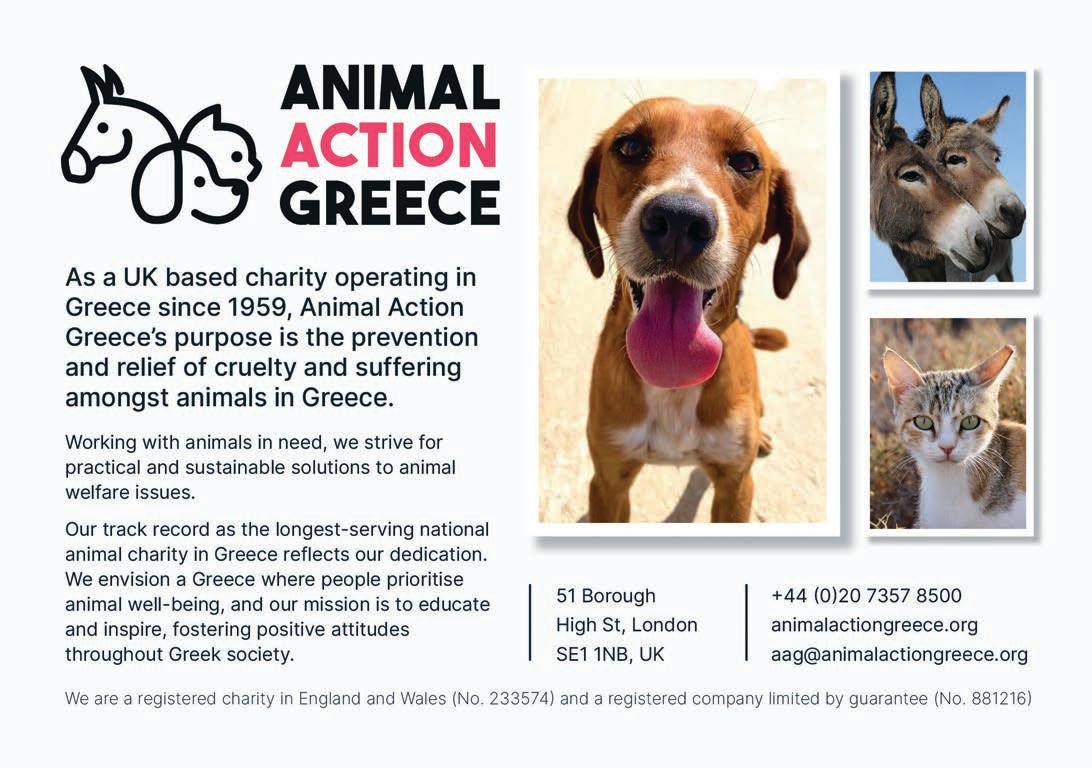

[ A PUBLIC CONSULTATION is underway aimed at refreshing and reshaping the Charity Governance Code. The consultation is open to charities across the country – both current users and those new to the code are invited to provide feedback, which will help make sure the code remains relevant and useful. The deadline to respond is 11 August 2024.
The Charity Governance Code sets principles and recommended practice for good governance. It is designed to be a tool for continuous improvement. The code was developed by a steering group with the help of over 200 charities, individuals and related organisations. It was last reviewed in 2020.
The Charity Governance Code Steering Group is undertaking the consultation about the code’s content, structure, applicability to different sizes of charity, language and accessibility. As part of the consultation process, they are keen to learn about charities’ relationship with the code, whether as a user or a non-user.
The survey is open to trustees and charity chairs, staff working in leadership or governance roles in charities and a wide range of professionals working in the sector and connected stakeholders.
Completed surveys are confidential and will be reviewed by the Steering Group in a form that is anonymised and seeks to outline patterns and differences in responses. Personal information will only be used to contact consultees if they indicate at the end of the survey that they would like to participate further and offer contact details.
The consultation can be completed at eu.surveymonkey.com. It is estimated that the time taken to complete the survey is no more than 30 minutes. There is no option to save responses and return to the survey, so it is helpful before embarking upon it to aim to complete it in one sitting.
For users of the code, the survey has the following sections:
• About you and your organisation
• Using the code
• Evolving the principles of the code
• Outcomes and recommended practice
• Accessibility of the code
• Barriers
• Sustainability of the code
• General feedback
Radojka Miljevic, chair of the Charity Governance Code Steering Group, commented: “This consultation is an important opportunity for us to hear from the sector. As a vital tool for assessing good practice in governance, we want to make sure that the code reflects the context charities are working in and that it can be used practically by organisations of all sizes.
[ HYPO HOUNDS provide a viable health care alternative for children and their families by training a Diabetic Alert Dog to detect the subtle changes in the child’s blood sugar levels.
The dogs are trained to alert parents when the child’s sugar levels drop dangerously low or rise too high. This not only impacts on the child but also on the family’s ability to function as a unit, with the registered carer becoming the dog.
“The Charity Governance Code is a practical tool to help charities and their trustees develop high standards of governance. The code draws upon the Charity Commission’s guidance, but is not a legal or regulatory requirement.”
Charities should continue using the current version of the Charity Governance Code for governance reviews while the consultation is happening. The consultation is generously supported by The Clothworkers Company, Wrigleys LLP and Withers LLP. q


Hypo Hounds work is becoming nationally recognised and is literally saving the lives of children – one sniff at a time. q

[ON 17 APRIL the Fundraising Regulator announced that it is to increase the fundraising levy and registration fee following a review.
The levy constitutes the bulk of the Fundraising Regulator’s funding and sees charities that spend over £100,000 on their annual fundraising activity pay a voluntary contribution to fund the regulator’s services. The levy has always and will continue to represent a small fraction of a percentage of a registered charity’s total fundraising expenditure.
Prior to implementing changes, the Fundraising Regulator sought views from people within charitable fundraising organisations who are responsible for paying the levy or maintaining registration with the regulator. In all, 222 responses were received.
Taking the responses into consideration the board agreed that the proposed changes will take effect over two years to mitigate the impact of the increase. Following the staggered increases in September 2024 and September 2025, further increases will be tied to the Consumer Price Index to ensure they are more gradual, with charities given advance notice before rises come into effect. In September the registration fee for charities outside the levy will also increase from £50 to £60.
Responding to the feedback from the sector, Fundraising Regulator chair Lord Toby Harris said: “Since the Fundraising Regulator was established in 2016 we have not changed what we ask charities to pay through the levy and registration fee. We are now eight years on and last year the board agreed that the levy would need to be increased for us to continue functioning at the level currently needed, to make sure our regulation is fit for 2030 and beyond. In December 2023 we consulted the sector to seek responses to our proposed changes.
“Charities spending £100,000 a year and more on fundraising are included in the levy. Our proposal was an increase in levy payments for everyone, but with the percentage increase being higher the more a charity spends on fundraising. Conversely, the less you spend on fundraising, the lower it would be. We also proposed the addition of two new bands within the levy and an increase to the registration fee.
“Our proposal sought to make the levy fairer for smaller organisations, who currently pay a larger proportion of their fundraising spend on the levy. We received 222 responses to the proposal from across the sector and are grateful for the time taken to reply to us. The findings of the review found that 51% of the respondents supported our proposals.
“However, 70% of levy payer respondents, representing 3.6% of all current levy payers, were opposed to the plans. Many respondents who were against the proposals shared a common concern about the size of the increase because of the increased financial pressures that charities are currently under. We recognise the impact the current


economic climate is having on charities and taking these concerns into consideration the board has agreed that, whilst the levy will have to go up for the first time in eight years, the proposed increases will be phased in over two years.
“We recognise that value for money is a concern, and it’s appropriate that we address how the landscape has changed since 2016 and the ways that we have grown and adapted to meet this. We are here to support charities at a time of rapid change, and last year we introduced our proactive regulation function to aid this.
“The first project undertaken was the market inquiry into the use of sub-contracting in face-to-face fundraising. We launched this in response to increasing complaints and self-reports in this area and concerns that were being shared with us directly and in the media.
“Our complaints caseload increased by 8% last year, including 20 self-reports by charities in the past 12 months. Many of our cases are increasingly complex and some see us leading or being part of investigations involving several regulators and other agencies. Last year we increased the size of the casework team to ensure we maintain our relationships with the charities we engage with as well as members of the public contacting us with concerns.
“As the sector evolves so must we, so that we can continue to support charities to deliver their vital work. And we must continue to engage with the public whose generosity enables charities to make a difference. Simply put, it is principally the levy that enables us to do this and to continue doing it effectively and proactively in the shared interests of charities and the generous public so that there is a continuing positive environment for fundraising to prosper.” q
[THE MISSION of Three Counties Dog Rescue is to accept, care for and find homes for unwanted, lost and stray dogs and cats and to ensure their wellbeing afterwards. The charity was founded in 1971 and since then they have improved the lives of over 7,800 dogs and cats. Before rehoming, all animals are vet checked, neutered, vaccinated, microchipped and kept in suitable conditions. Rehabilitation costs are a major part of the charity’s annual expenditure of over £200,000. Healthy animals are never put down. As part of that non-destruction policy, several elderly dogs are kept in long term foster care. However, this means that the charity can incur large veterinary costs to maintain a dog’s health while they await a new permanent home. They now provide boarding and cremation services with profits supporting the Rescue. Every penny raised goes to improving the lives of dogs and cats. Three Counties Dog Rescue is run entirely by voluntary and unpaid helpers, who also meet their own expenses. q
The range of charities which depend on legacies to carry out their valuable work is a broad one. Those that are represented in this publication are listed below, grouped according to the area of activity in which they operate.



Friends of the Animals 4/5
Marine and Wildlife Rescue 7
Universities Federation for Animal Welfare 8
Wild Futures 9
Humane Slaughter Association 12
Essex Horse and Pony Protection Society 13
The Suffolk Punch Trust 24
Heartbeat Home for Horses 24
Tiggywinkles 25
Isle of Wight Donkey Sanctuary 30
Edinburgh Dog and Cat Home 30
Hessilhead Wildlife Rescue 31
Suffolk Owl Sanctuary 32
Last Chance Animal Rescue 32
Remus Memorial Horse Sanctuary 33
The Fox Project 34/35
Hope Rescue 36
The Horse Rescue Fund 36
Catholic Concern for Animals 37
Paws2Rescue 38
Ferne Animal Sanctuary 39
Wales Ape & Monkey Sanctuary 40
Shire Horse Society 41
Oak Tree Animals’ Charity 42
British Chelonia Group 43
Animal Action Greece 44
Three Counties Dog Rescue 46
ZANE: Zimbabwe A National Emergency 16





Prostate Cancer Research 1
Sight Research UK 2
Cancer Prevention Research Trust 6
Pain Relief Foundation 6
Caring Cancer Trust 10/11
CLEFT 14
Heartburn Cancer UK 18/19
The National Brain Appeal 20
MS Society 22/23
The British Association for Cancer Research 44
Brain Research UK 45
FRAME 48
Kidney Kids Scotland 16
Parenting Together 28
Hypo Hounds 45
The Partially Sighted Society 14
National Federation of the Blind of the United Kingdom 17
The Respite Association 26/27

